BSE Aachen Report
Engineering with Purpose:
A Responsible Approach
“The engineer's first job is to make things work, and the second is to ensure that they do no harm.”
Unknown

“The engineer's first job is to make things work, and the second is to ensure that they do no harm.”
Unknown
BEST, Board of European Students of Technology, is a constantly growing non-profit and non-political organisation Since 1989, it has provided communication, co-operation, and exchange opportunities for students across Europe
With 84 Local BEST Groups (LBGs) in 30 countries, BEST is building a well-organised, powerful, and innovative student network
BEST aims to help European students of technology become more internationally minded by fostering a better understanding of European cultures and developing their ability to work on an international level The organisation creates opportunities for students to meet and learn from one another through academic and non-academic events, as well as educational symposia. While "Learning makes the master," the ultimate goal is a successful career. To support this, BEST offers services like an international career centre to help students broaden their job market horizons
The organisation's priority is to provide high-quality services to students across Europe, bringing together the "student-company-university" triangle more effectively
The Educational Involvement Department (EduID) is the coordinating body of all BEST Symposia on Education EduID is responsible for opening the call and for selecting the LBGs hosting the BEST Symposia on Education EduID is responsible for supervising all the content related to a BEST Symposium on Education.
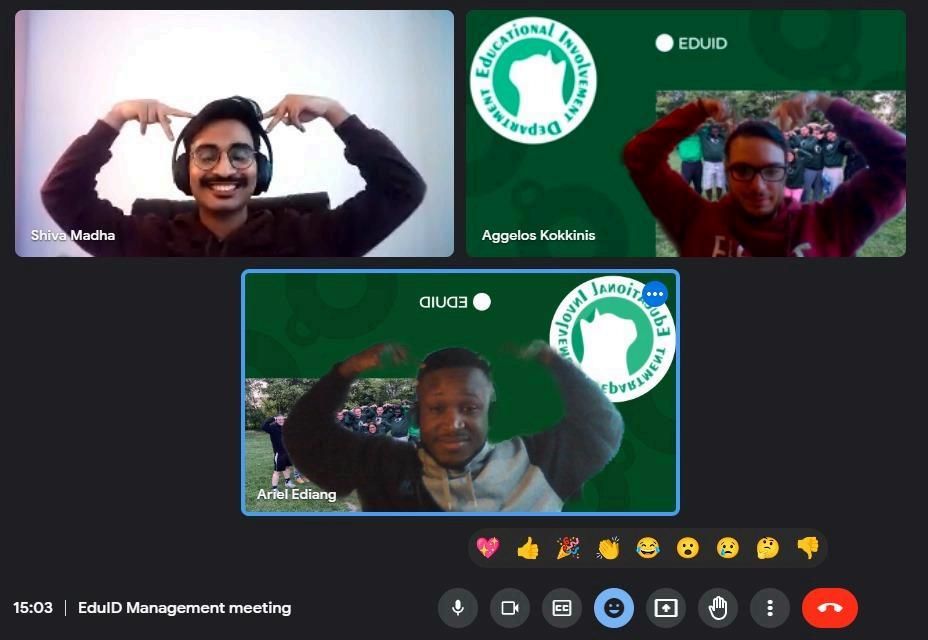
“Engineering is not only about technical skills; it’s about understanding the societal impact of what we create.”
Unknown

A BEST Symposia on Education (BSE) is an event where students discuss educational topics, together with university and/or company representatives. Students have the chance to identify current problems and propose innovative solutions, with the aim of defining the future of higher education in Europe The gathered opinions are disseminated through scientific work and presented at conferences to universities, companies and higher education institutions representatives
Participants have the opportunity to discuss, share ideas, and find solutions to current Higher European Education matters, alongside experts in the field Throughout the event, students develop skills such as oral presentation, academic discussion, debating, teamwork, as well as analytical, critical, and innovative thinking, among other relevant soft skills related to project analysis and development
EduID, through the BSE coordinator, together with the organising LBG, should agree on the main topics to be discussed The LBG may have some proposals due to an agreement with the university or any kind of government/university financial help It is also important to have in mind the possibility of finding expert professors in the host university. The topic of BEST Symposia on Education is defined for each individual BEST Symposia on Education by the Educational Involvement Department in cooperation with the organising LBG
Website link: https://www best-aachen de/bse2024
Through this BEST Symposia on Education, the aim was to raise awareness about the importance of Responsible Engineering, with a focus on ethical practices, sustainability, and the social impact of engineering in today’s world This approach encouraged students to think beyond technical innovation, considering the broader implications of their work for society and the environment, thereby fostering a generation of engineers equipped to lead responsibly
The topic of Responsible Engineering is increasingly relevant due to its links with sustainability, ethics, and humanitarian impact It addresses how future engineers can help tackle global challenges responsibly For students, it offers a chance to explore academic and career pathways aligned with responsible engineering and reflect on how these may vary by region, degree, or institution. This discussion highlights the essential role engineers play in creating sustainable and ethical solutions for society
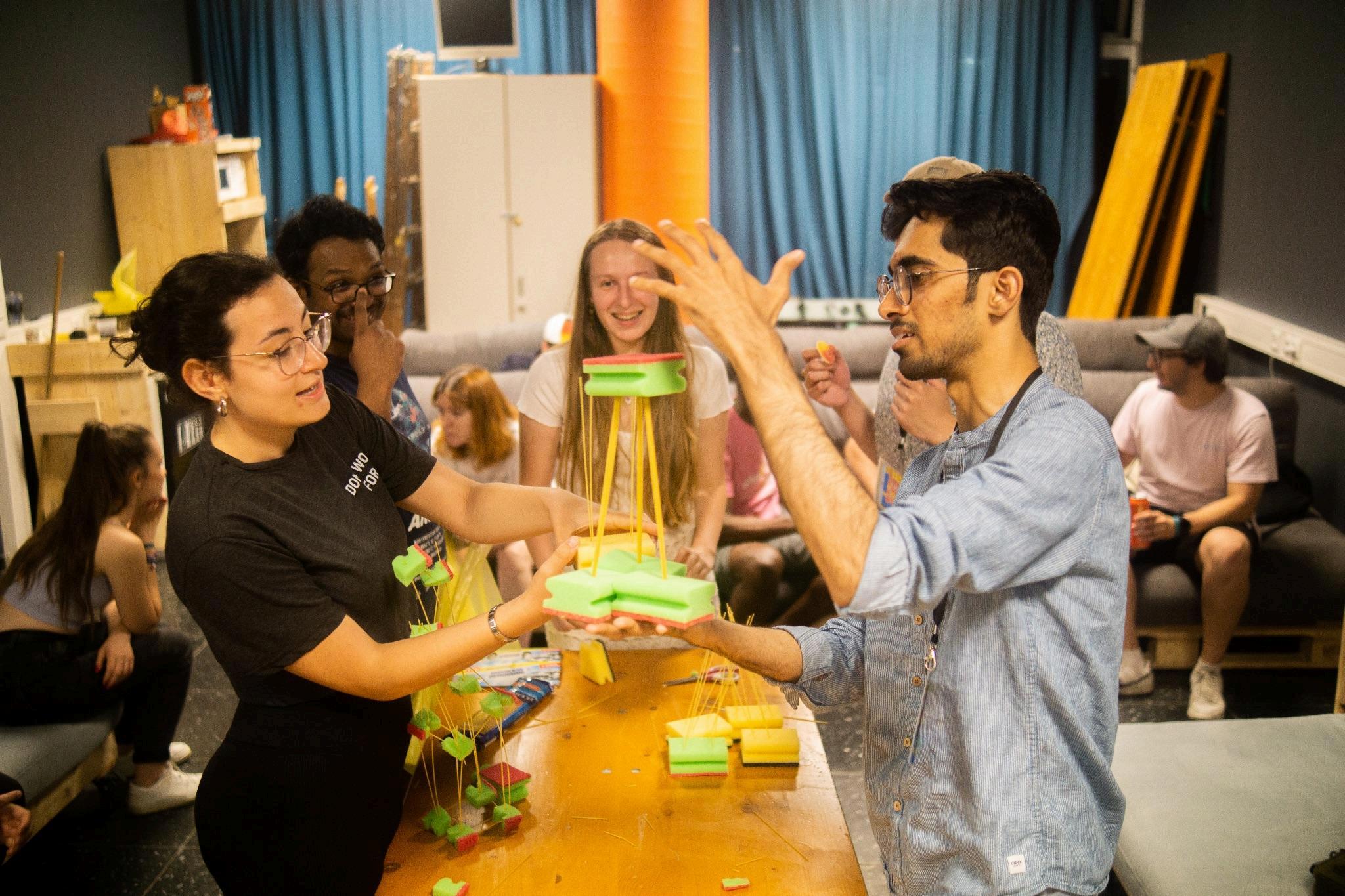
“The engineer's first job is to make things work, and the second is to ensure that they do no harm.”
Unknown
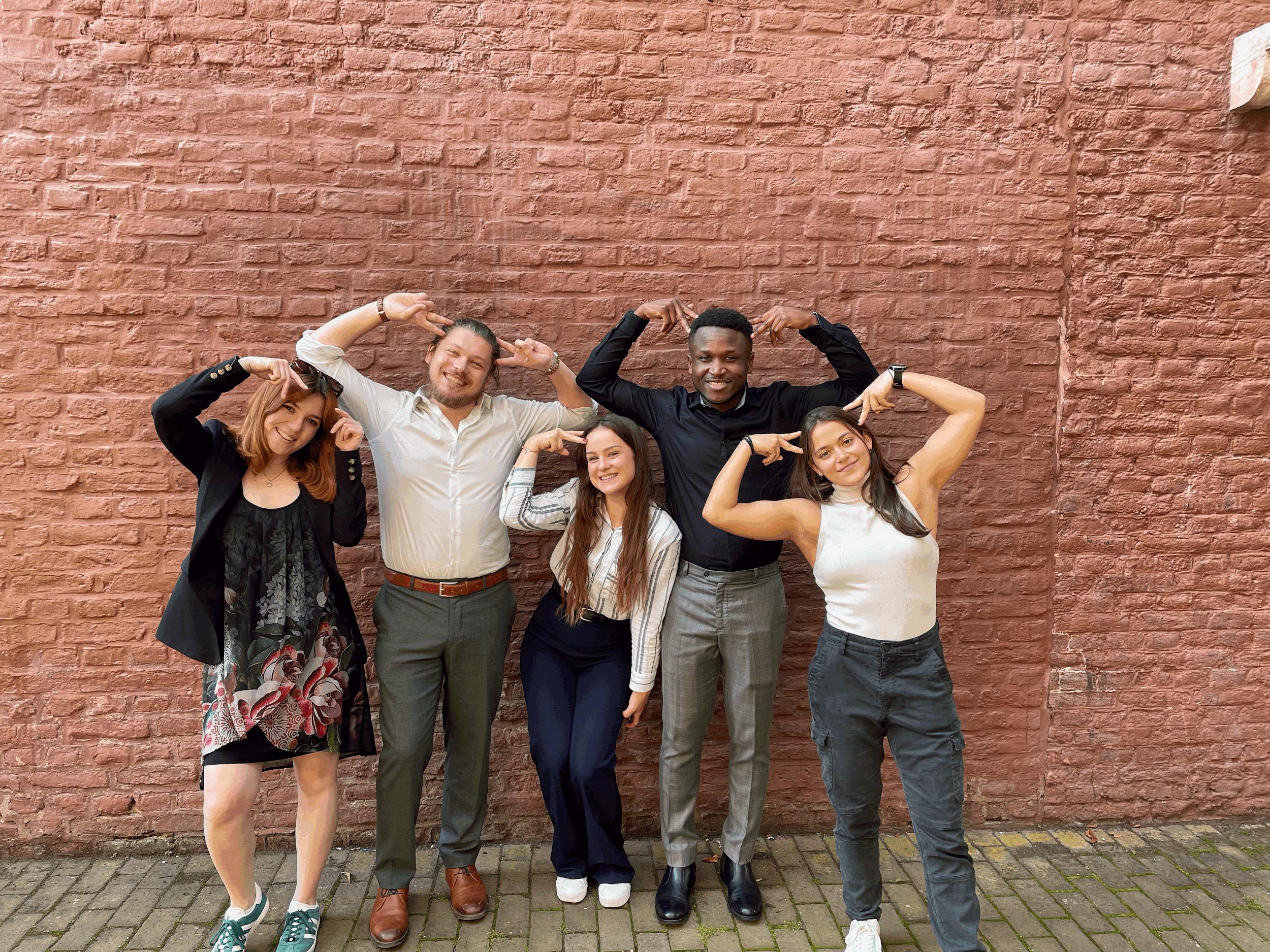
“In the sweetness of friendship let there be laughter, and sharing of pleasures. For in the dew of little things the heart finds its morning and is refreshed.”
Khalil Gibran
EduID elects a BSE Coordinator for each BEST Symposium on Education The BSE Coordinator is the contact person between EduID and the LBG hosting the BEST Symposium on Education, but also is part of the Content team. The BSE Coordinator is responsible for the success of the BEST Symposium on Education
The Content Team is responsible for the overall design and delivery of the working hours and workshops at the event They prepare, design, and facilitate sessions, ensuring activities align with the goals of the BSE and meet participants' needs The team strives to create interactive, inspiring, and valuable workshops, fostering a supportive environment for knowledge exchange and skill development.
Name: Viktorija Barisic (BSE Coordinator)
Background: Master in Software Engineering and Artificial Intelligence, University of Belgrade
Contacts: viktorija barisic@best-eu org, +381 611086384
Resume/CV: Viktorija’s CV
Name: Ariel Ediang
Background: Master in Mechanical Engineering with a focus in Sustainable Automotive Engineering, University of Liège
Contacts: ariel.ediang@best-eu.org, +32 466114763
Resume/CV: Ariel’s CV
Name: Lenka Milosevic
Background: Master in Software Engineering and Artificial Intelligence, University of Belgrade
Contacts: lenka milosevic@best-eu org, +381 63 7771409
Resume/CV: Lenka’s CV
Name: Valentina Pazos
Background: Degree in Biomedical Engineering, University Madrid Carlos III
Contacts: valentina.pazos.valero@best-eu.org, +34 686 00 83 71
Resume/CV: Valentina’s CV
Name: Tuur Knevels
Background: MSc in Aerospace engineering, Delft University of Technology
Contacts: tuurknevels@best-eu org, +32 468 30 89 57
Resume/CV: Tuur’s CV
Aachen, known as an “Europastadt” (City of Europe), is Germany’s westernmost major city where three nations with three languages converge. It is the centre of a dynamic, cross-border knowledge region and stands for world-class university education in Natural Sciences and Engineering
Aachen is famous for its Cathedral, the Town Hall and its many Spas It serves as a big health resort for the region because of the geothermal springs, which are the hottest in continental Europe (74°C) Casanova, Peter the Great, Charlemagne and many other historical figures used to bathe in Aachen, so for centuries it was known informally as the “Spa of Kings”
The idea of BEST in Aachen was introduced after its first president returned from Erasmus studies in France, motivated to bring the BEST spirit to the university By November 2012, the group officially became part of RWTH Aachen University and applied to become an Observer of BEST.
In November 2013, at the Presidents Meeting in Brno, the group successfully applied for "baby member" status. Since then, BEST Aachen has been an official member of the Board of European Students of Technology
The group now aims to bring BEST closer to students by organising more events in the future.
President: Shubham Verma
Secretary: Ramanuj Sharma
Treasurer: Varun Polpakkara
VP CR: Ali Kimiagari
VP HR: Maciej Weroniczak
VP PR: Wiktoria Kwaśniewska
“Alone we can do so little; together we can do so much.”
Helen Keller
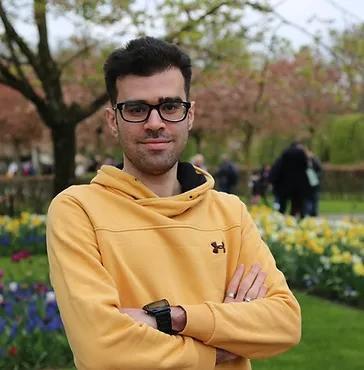
Joint Main Organiser

Gustav Hellings
Joint Main Organiser
ali kimiagari@best-aachen de gustavhellings@best-aachen de
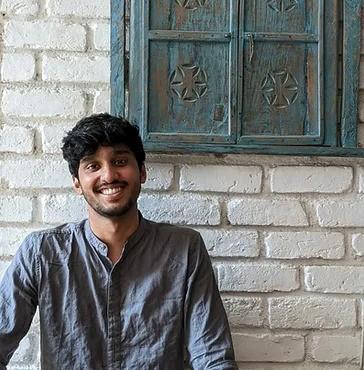
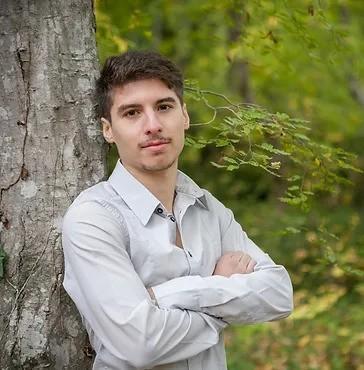
Varun Polpakkara Maksim Uzonov
Vivaldi Responsible Pax Responsible
varun polpakkara@best-aachen de maksim uzonov@best-aachen de

Abdul Rafay
Food and social Responsible

Food and social Responsible abdul rafay@best-aachen de
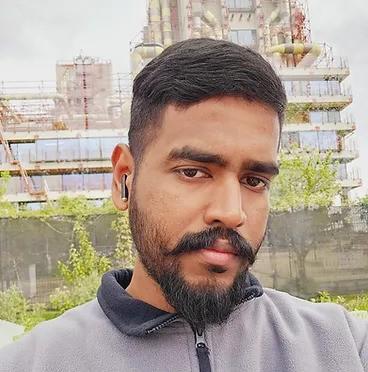
Ajay Kumar
Logistics Responsible
ajaykumar@best-aachen de
aamirkhan@best-aachen de
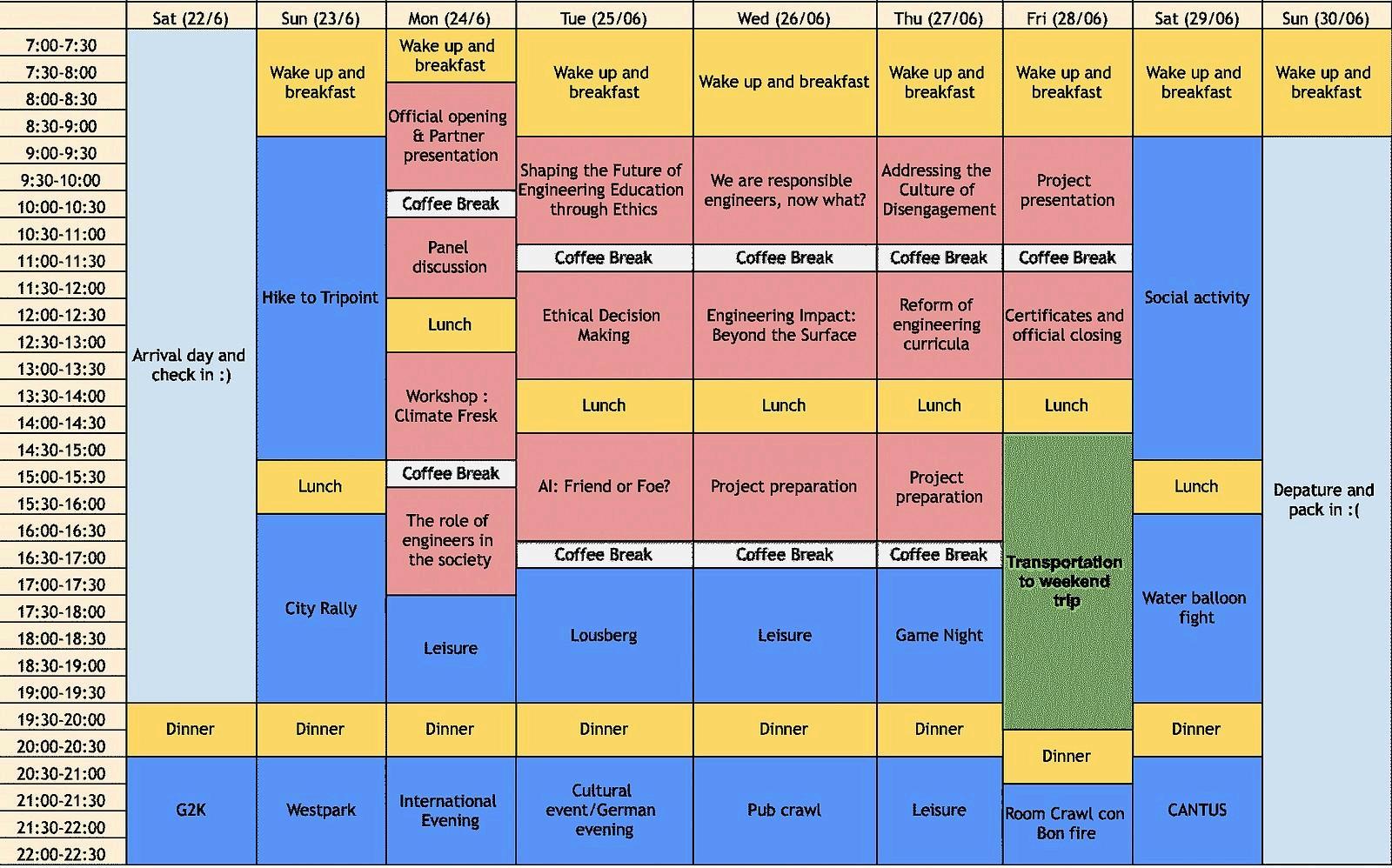

Hagen Wegner - Director | Sustainability strategies | FEV Consulting
With over 20 years of experience in consulting and engineering, Hagen Wegner is passionate about helping clients achieve sustainable and innovative solutions for their products, production, and supply chain challenges. As a Director at FEV Consulting, he develops projects focused on circular economy, manufacturing process improvement, and corporate and product strategy across various industries, including automotive, energy, and aerospace He leverages his MBA and Dr-Ing in production engineering, along with
certifications in ESG, sustainability strategies, and circular economy, to provide strategic, technical, and operational guidance to clients and stakeholders.
He has a strong track record of delivering results in previous roles, such as at FLAMM GmbH, where he served as Technical and Managing Director There, he led the development and implementation of new products and technologies, as well as the optimization of processes and systems Driven by a mission to create a positive impact on the environment and society, he enjoys collaborating with diverse, talented teams to achieve shared goals and visions

Vivek Ramachandran, Ph.D., is a Lecturer at the Centre for Engineering Education at University College London (UCL), focusing on ethics, computing, sustainability, and responsible innovation within the Integrated Engineering Programme. His research focuses on the interplay between ethics, emotions, and engineering using digital tools for education.
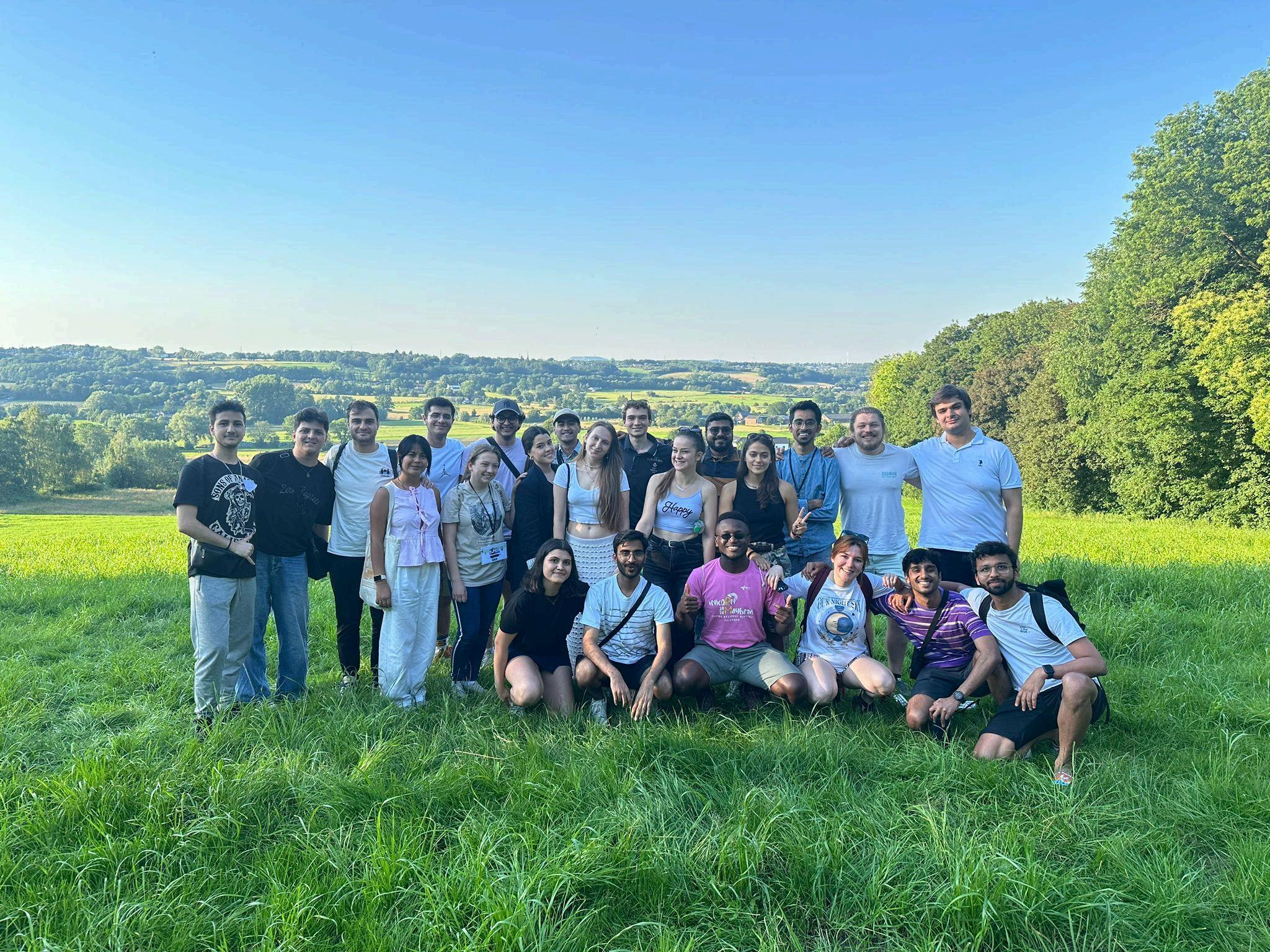
“Building bridges between cultures fosters understanding and friendship, creating a better world for everyone ” Unknown
Name and surname
Country
University
Birand, Ahmet Tolga Türkiye Istanbul Technical University
Öncan, Asli Türkiye Boğaziçi University
Ashraf, Syed Areeb Germany
Friedrich-Alexander-Universit ät Erlangen-Nürnberg
Yurtözveri, Bora Türkiye Istanbul Technical University
Saqui, Axcell Canada University of Manitoba
Misevska, Lora North Macedonia
Faculty Of Electrical Engineering And Information Technology
Kansu, Kerem Türkiye Yıldız Technical University
Aydin, Muhammet Oguz Türkiye Yıldız Technical University
Fiestas Zúñiga, María Pía Spain
Universidad Politécnica de Madrid
Erdogan, Mert Türkiye
Guzelbektes, Oguzhan Türkiye
Yildiz, Günaycan Türkiye
Vladislava, Musin Republic Of Moldova
Sabio, Luisa
Portugal
Istanbul Technical University
Istanbul Technical University
Yıldız Technical University
Technical University of Moldova
Unıversıty of Coımbra
Each of these working methods represents a unique approach to learning and engagement, allowing participants to develop a variety of skills in different contexts and give their opinion
A panel discussion consists of a group of experts or experienced individuals who share their insights on a relevant topic This format allows for a diverse range of perspectives and encourages audience engagement through questions. It typically includes moderated discussions that highlight different viewpoints, making it ideal for complex subjects that benefit from multifaceted exploration
Workshops are interactive sessions that provide participants with hands-on experience in specific skills or topics They are designed for active learning, where attendees engage in practical tasks, discussions, and collaborative exercises. Workshops often focus on developing skills such as problem-solving, critical thinking, and teamwork, making them valuable for experiential learning environments
A brainstorming session is a collaborative activity aimed at generating ideas and solutions in an open and judgement-free atmosphere Participants are encouraged to share their thoughts freely, which fosters creativity and innovation. The emphasis is on quantity over quality, allowing for a diverse array of ideas to emerge, which can then be refined and developed further
Group activities are structured tasks that promote teamwork and collaboration among participants These activities require participants to work together to complete a specific challenge, enhancing communication and fostering a sense of community. They often emphasise the importance of utilising diverse skills and perspectives to achieve a common goal
Types of the group activities: Debate
A debate involves structured argumentation where participants take opposing sides on a controversial issue Each side presents its arguments and engages in counter-arguments, encouraging critical thinking and effective communication Debates help participants develop their ability to articulate their thoughts clearly, analyse opposing viewpoints, and engage in respectful discourse
A case study is an in-depth examination of a real-world scenario, often used to analyse and solve complex problems. Participants explore the details of the case, identify key issues, and propose solutions based on their analysis. This format allows for practical application of theoretical knowledge and encourages critical thinking and problem-solving skills
Presentation
Presentations involve individuals sharing information or insights on a specific topic in a formal setting. They typically include visual aids and structured content to effectively convey messages to an audience Presentations aim to enhance public speaking skills, organisational abilities, and the capacity to communicate ideas clearly and persuasively
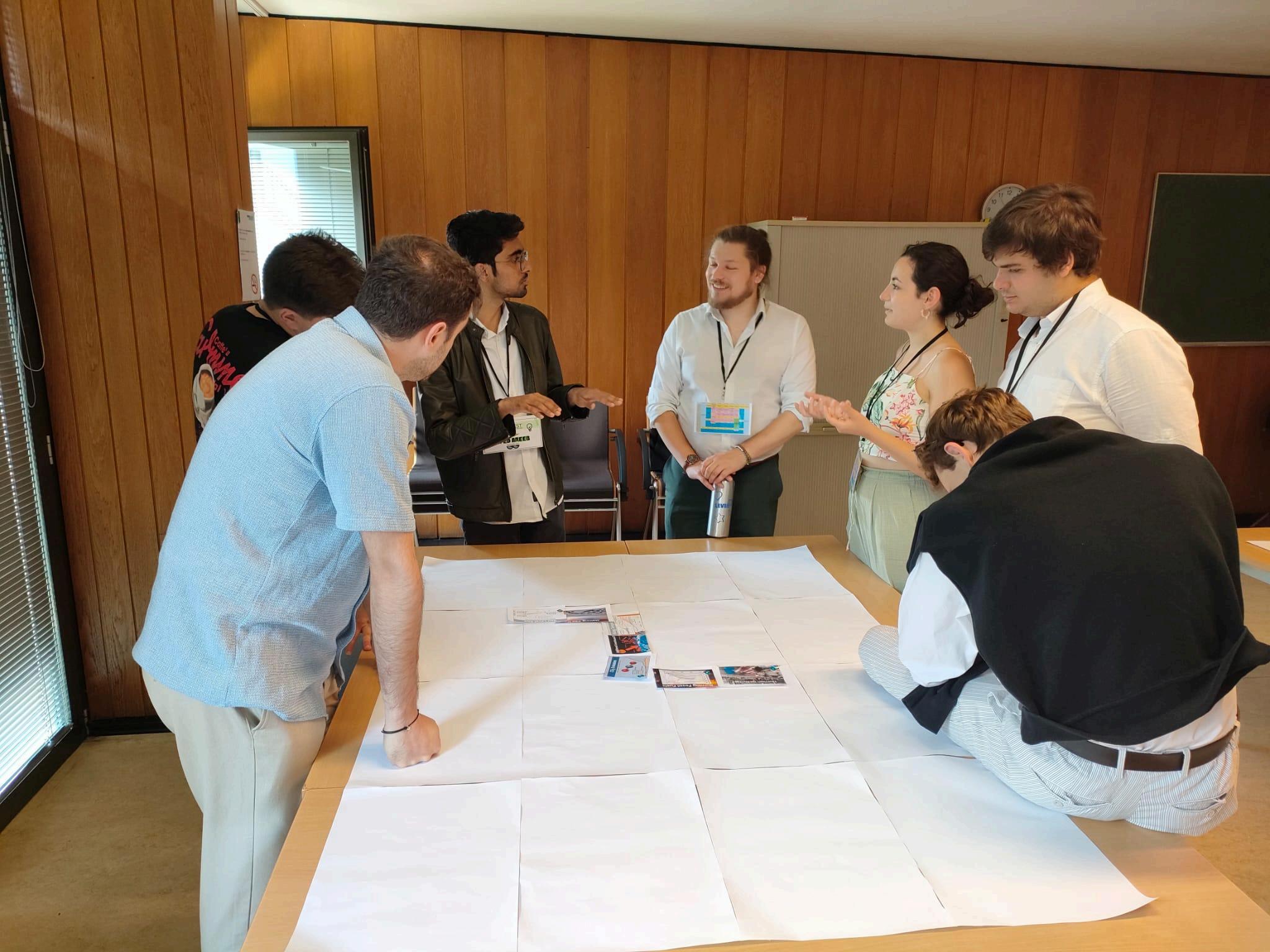
“As engineers, we have a responsibility to build a better world, ensuring our work contributes positively to society and the environment.”
Unknown
Name Engineering Ethics: Crash Course Engineering #27
Topic/field Understanding of the topic Responsible Engineering
Short Description Video that provides a basic overview of Responsibility Engineering.
Name Engineering Ethics
Topic/field Understanding the ethics (in engineering)
Short Description Video that provides a discussion of ethics and how they apply to engineers
Name Engineering ethics: overview
Topic/field Engineering ethics
Short Description Engineering: issues, challenges and opportunities for development, UNESCO report, p 184-186, further discussion and ethical theories, p 186-188
Name Professional Social Responsibility in Engineering
Topic/field
Short Description
Social responsibility in Engineering
This chapter explores the social responsibilities of the engineering profession, encompassing issues of ethics, safety, environmental protection, and social justice. It analyses engineering codes of ethics, educational requirements, and the attitudes of students and professionals
Participants were asked to share their perspective on Responsible Engineering and to give their opinion on the question “What is Responsible Engineering?”
Some answers are listed below:
“I think responsible engineering means that an engineer could take any good or bad results into their responsibility and is aware of the fact that every single thing they do will conclude in a way that they will get affected As engineers, we do several things that affect people’s daily lives, and any error during the production or usage of these products might damage a lot of people. This is why an engineer should take responsibility for the things they have done If every engineer reaches the awareness, possible problems will be reduced As a sophomore Industrial Engineer, it would be true to say that the part that mostly makes me excited is session 4. Our education and curriculum consists of a few parts of ethics
through our university lives, and there is no doubt that ethics should be involved more in the curriculum so that the new engineers understand the importance of taking responsibility and making ethical decisions. In last year’s lessons, I have taken several ethics classes and these classes helped me figure out how to act if I encounter possible ethical dilemmas That is why I think we should consider this topic as a crucial issue ”
“From my point of view ethics is doing the right thing But because the right thing is hard to determine we have to determine more specific rules For example we should not make decisions that will do a lot of harm to a big number of people We must also check our projects and products to ensure they are secure.
The most intriguing part of pre-materials was the part about ethical dilemmas, because there are some cases where it is really hard to understand what the right thing is ”
“After reviewing the content, I am particularly drawn to the sessions on Engineering Ethics
My strong interest in philosophy drives this preference, as it aligns with the ethical considerations crucial to our profession I'm particularly looking forward to these sessions
Additionally, I am very intrigued by the idea of introducing multiple settings like panel discussions, games, and workshops around similar topics This variety ensures the sessions won't become monotonous, as can sometimes happen with extended panel discussions The mix of formats will encourage brainstorming and active learning, which I find very appealing. On the topic of Responsible Engineering, as a philosophy and ethics enthusiast, I believe that understanding the ethical implications and social responsibilities of our work is of greater significance than technical skills alone Responsible Engineering requires a commitment to sustainable practices, social justice, and the ethical application of engineering principles. It involves recognizing the far-reaching impacts of our work and striving to make positive contributions to society
Philosophers like John Stuart Mill and Hans Jonas underscore the importance of promoting the greatest good and ensuring the future viability of humanity, principles that align with sustainable and ethical engineering practices Embracing these philosophies, we can ensure that our technical expertise serves to enhance human welfare and protect the environment ”
“I think responsibility is a key aspect of any engineering discipline As an engineer it is our responsibility to make sure we make the best-informed decisions, not only during the design process, but also during the initial phases (for example, brainstorming) and the "end" phases (monitoring and maintenance)
As engineers we typically communicate with stakeholders and our clients By doing so, we form a bond, which eventually builds trust. Ethics play a huge role in the decisions we make, and it is our responsibility to ensure that our decisions are in the best interest of all those who are involved It is crucial that we take our responsibilities seriously because there will likely be severe consequences if we do not ”
“Good engineering is about making the right decisions, not just for today, but for generations to come ”
Unknown

Date: 24/06/2023
Facilitator: Tuur
Minute taker: Lenka
Background
This session has been based on the Climate Fresk workshop as developed by Cédric Ringenbach and the Climate Fresk association It is a workshop that distils the knowledge of the IPCC reports in a tangible and interactive game and demystifies the cause and effect change of climate change in an approachable way The goal of the session was in part for participants to understand these causes and effects relations of climate change and in part to develop critical thoughts on which actions can be taken to compact climate change In the scope of the BSE, this development of actions has been focussed on both personal actions and on changes within the higher engineering education system.
Methodology
The section has been structured in four main parts.
1 As this was the first workshop session of the event, a general introduction has been provided to introduce participants to the concept of the workshop and participant interactions, highlighting that this is not a lecture and that the outcomes of these sessions are dependent on their active participation. This also included a general introduction to the Climate Fresk, including the problem statement of combating climate change, providing an overview of the outline of the workshop and highlighting the importance of sharing information and education on the topic.
2 The second part of the workshop consisted of the “Fresk”part itself During this activity, participants were split in 2 groups and gathered around large tables with flip charts where they would build the “Fresk” or “collage” throughout various rounds In a series of five rounds, each group was provided with a set of cards (developed by the Climate Fresk organisation) and asked to arrange these from cause to effect As more cards are introduced throughout the different rounds, the total picture becomes more and more complex and participants are encouraged to discover the relations between various aspects highlighted on the card sets After handing out each set of cards there is room for clarifying questions and a small check by the facilitator to steer the participants in the right direction
3. After the final collage is complete the participants are invited to express their creativity and emotions This can be done by adding drawings, highlighting important cards or connections between them and coming up with a name of their “Fresk” This step is aimed at developing a sense of ownership over their learning and invites participants to reflect on what they have learnt and what stood out to them.
4 Finally, after the creativity round, both groups are invited to a joint group discussion during which the participants are invited to share their thoughts, considerations and emotions on the subject. This is followed by a call to action in which participants can
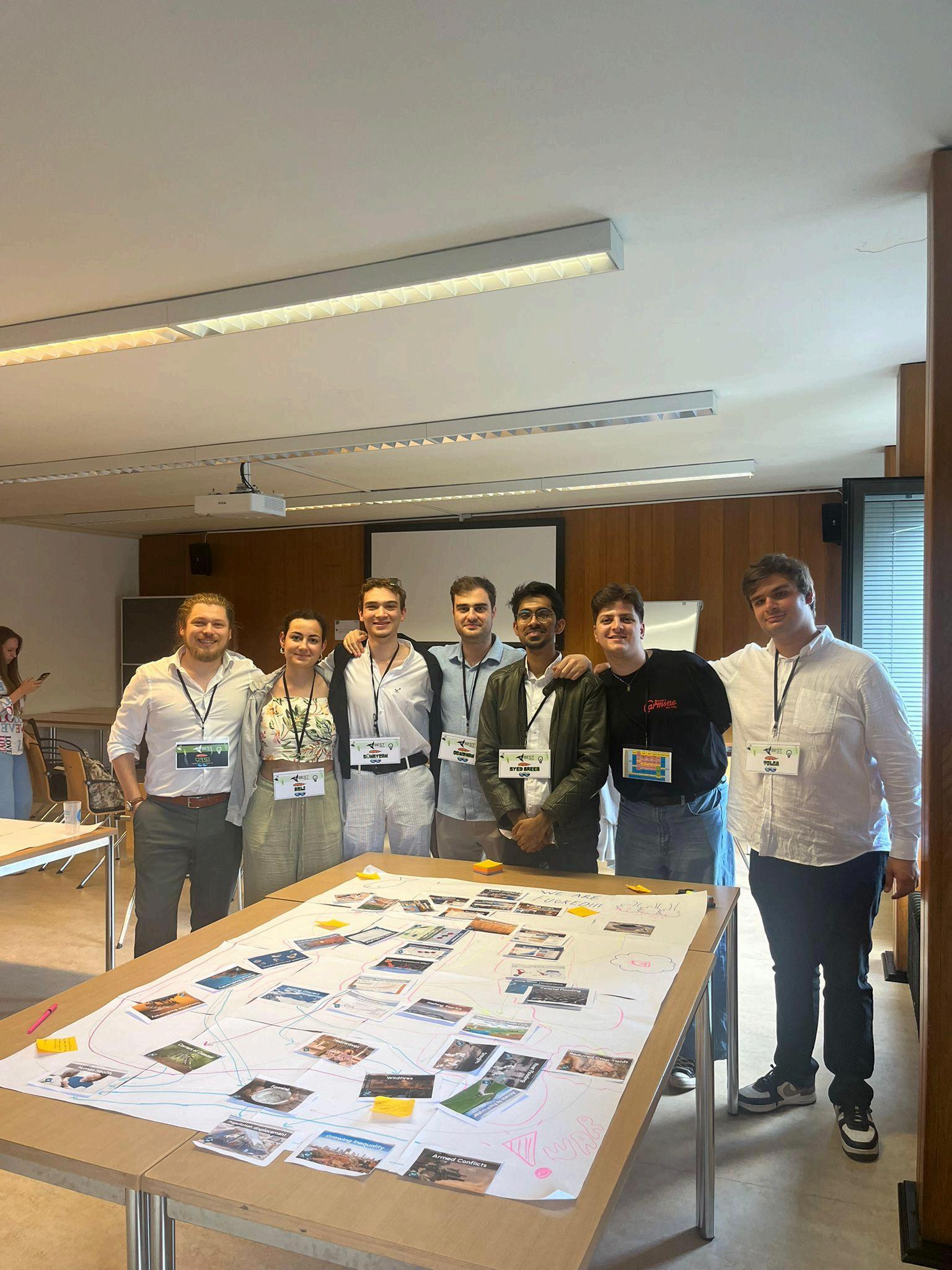
Finally, we also and invited the ns throughout the
hotos below
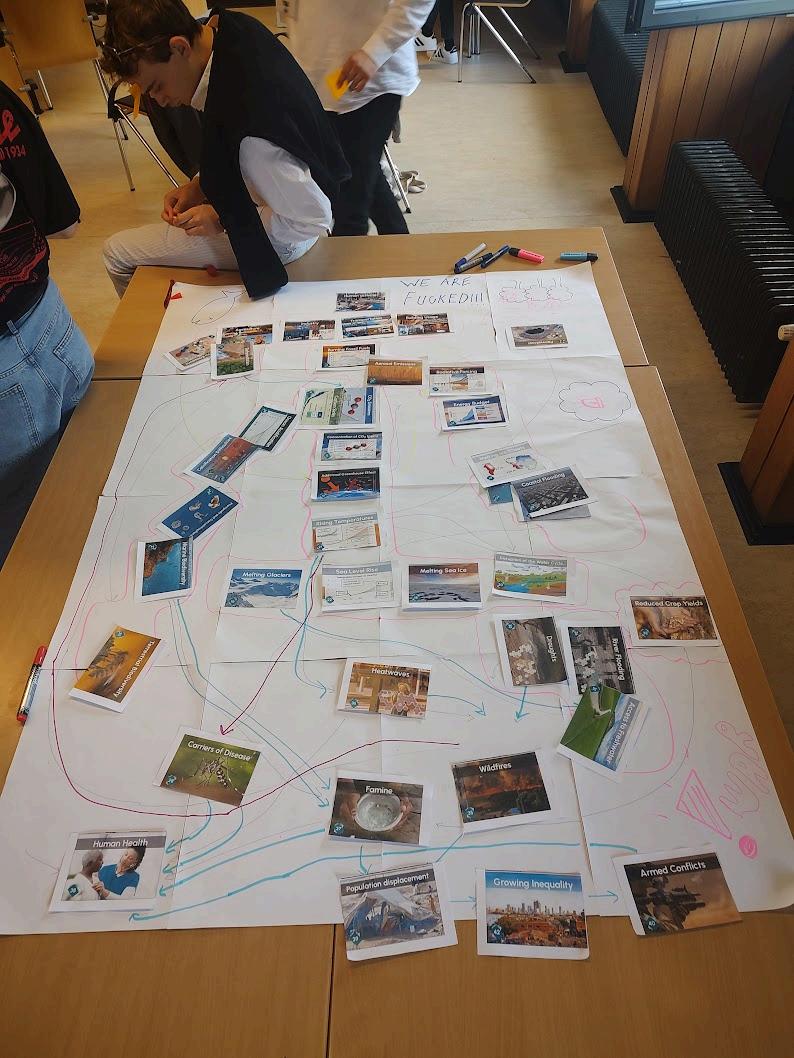
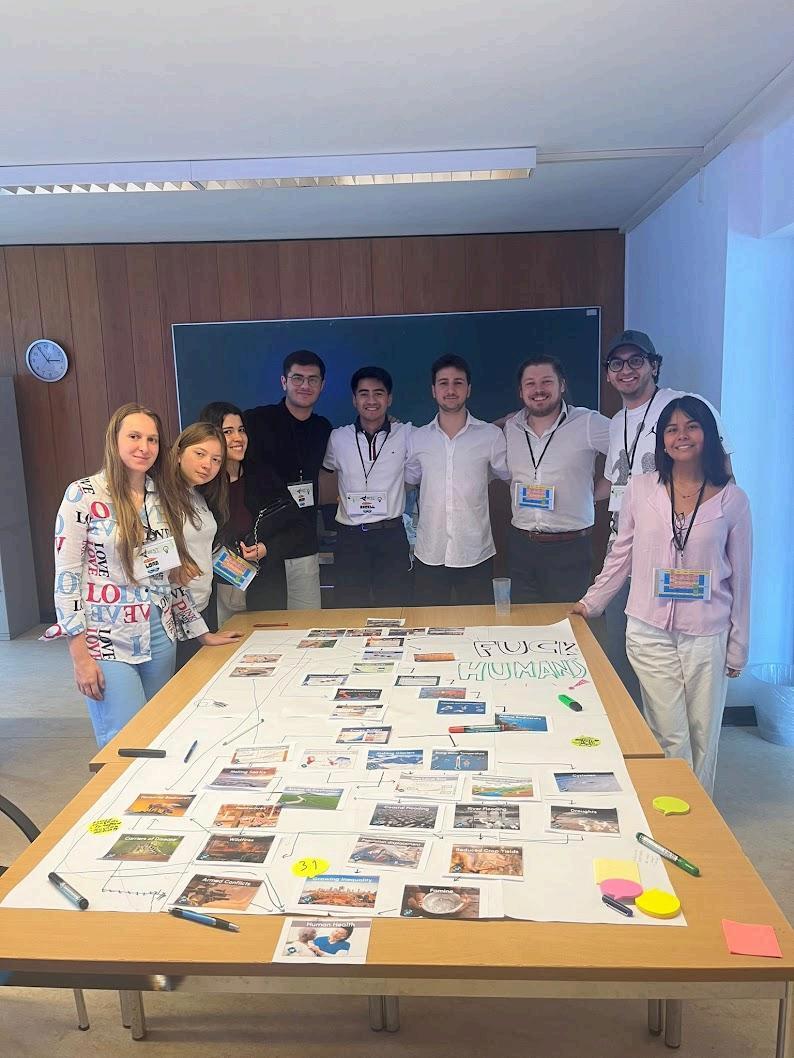
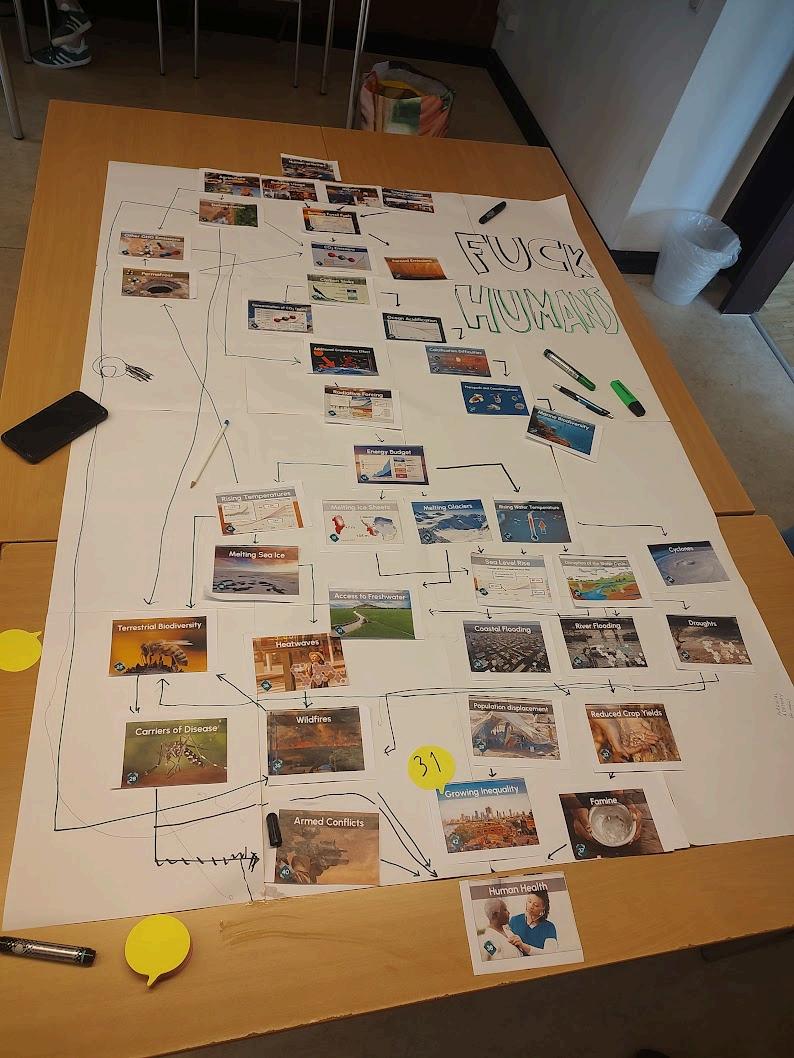
To initiate the group discussion we did go over the outcomes of the Fresk itself and highlighted how it all starts and ends with human actions This led to the introduction of the notion that perhaps, if humans are the cause of climate change, humans also have the ability to change the course back. And especially engineers as we directly play into the first four cards: Industry, Transportation, Agriculture and Building usage We have the power to instil change at the source and this change, if positive, can also bring positive changes further down the cycle
After this the participants were asked to express their emotions after this activity and were provided with the following images to aid putting their feelings into words
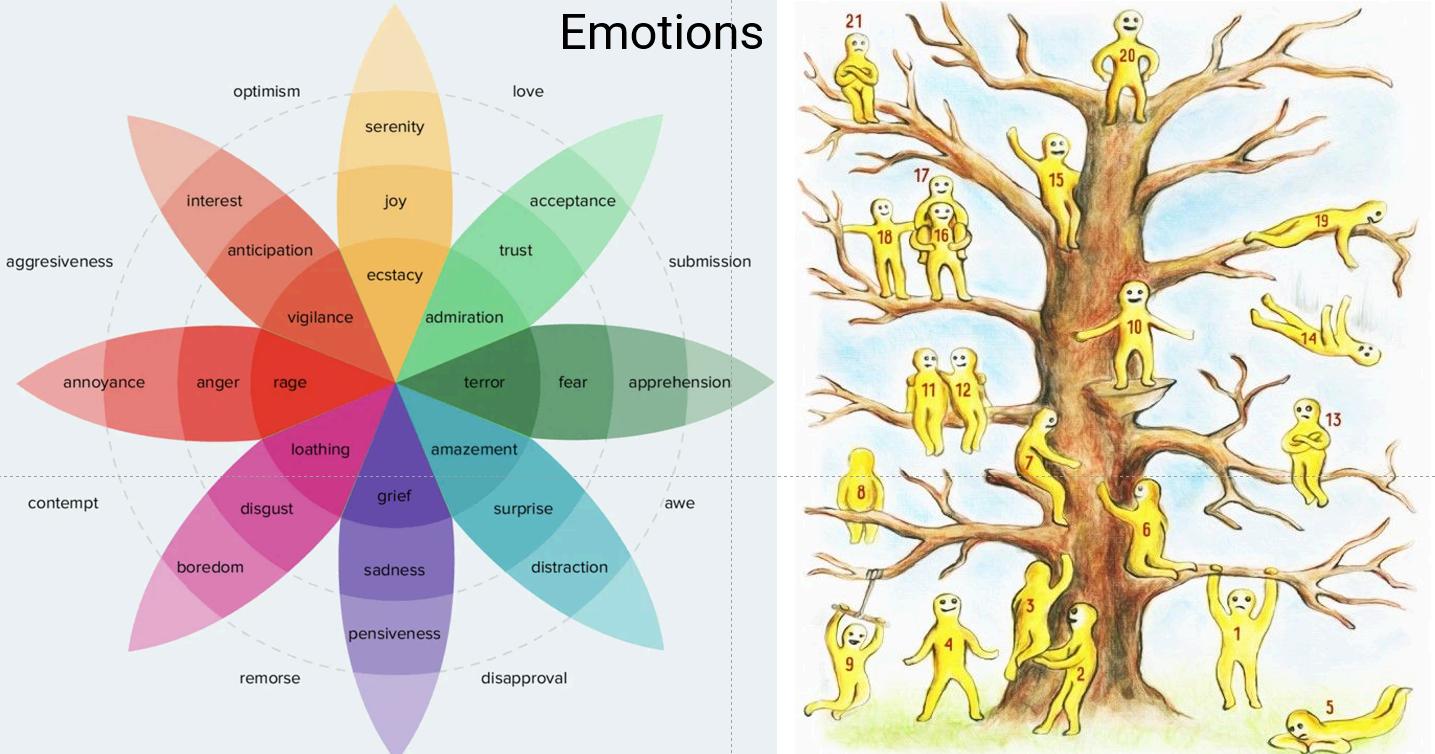
Some comments from the participants:
Pax 1: It gave me terror of all the effects that are in place but also hope because I know that we can make a change
Pax 2: I felt like number 14, that we are done But the exercise afterwards gave me hope
Pax 3: I felt like 19 because I think that we can catch the planet falling down.
Pax 4: I feel like 8 because we have a lot of methods that we can apply but are not doing them and ignoring the problem too much
Pax 5: I feel like 20 because of all the knowledge we received in this session
Pax 6: I felt like 2 because of the teamwork that we had during the activity. Also, to solve climate change, we have to team up
Pax 7: I felt like 19 because the situation is getting worse but we did start to work on it and are trying to solve it.
These feelings were then coupled to the kubler-ross curve which displays the typical emotional response to change:

Tuur highlighted that it is very normal to be in the “depression” stage but that it is okay to be there for now and that we need to pass through it to realise that we need to start experimenting and trialling changes which eventually leads to decisive actions Due to time constraints, the session was concluded with this notion and participants were invited to keep these thoughts in mind throughout the rest of the event so they could use them to explore and experiment with solutions in future workshops
Materials
● Outlines; [Day01][Tuur][Outline][BSEAachen 24] Climate Fresk
● Minutes; [Day01][Tuur Knevels][Minutes][BSEAachen 24] Climate Fresk
● Link to the climate Fresk website; https://climatefresk org/world/
● Photos [Climate fresk][Tuur]
Date: 24/06/2023
Facilitators: Valentina and Ariel
Minute taker: Viktorija
Background
The purpose of the session was to familiarise them with ethical issues engineers have to face, and the current tool used to tackle said problems, which is the Engineering Code of Ethics. We were looking to widen their way of thinking when facing an ethical problem. To do this, we carried out a collective project and debates on ethical dilemmas
Methodology
After a brief introduction on some terms, the session started with group work The participants were divided into three random groups of a similar size and got the task of creating an Engineering Code of Ethics without the internet, so as to find out what they find most important when considering the rules to be a responsible engineer. Afterwards, together we unravelled the actual European Code of Ethics and the groups debated and competed to add additional ideas and rules to the real Code of Ethics From this we were able to obtain what rules they thought were most relevant for engineers to follow so as to be considered ethically responsible.
After a short break, they were split into four groups, and handed one mystery card each Two cards discussed the depoliticization of engineering, for and against, and the other two were about whether engineering should be vocational or money oriented. They were given time to come up with points, and then the teams with the same topic debated. At the end, we were able to obtain a conclusive opinion on each topic
Outcomes
● Why do we need ethics in engineering? Watched a video about it
● Explanation of the Code of Ethics and its purpose
They were given 3/11 points of Code of Ethics as an example, participants should think and come up with ideas for other points. (Valentina: One is that we ensure safety, health and welfare of the public And the second is that we avoid adverse impacts on the environment And the third is to take care of the societal and cultural values of the society that we are working in Okay, so those are just three examples There's actually 11 points, which I will reveal later, because I want you to think without the internet of more points)
Teams brainstorm possible points for the Code of Ethics, and then present
Ideas teams came up with:
First team
1. Respect basic human rights
2 Make more sustainable creations for the future (to not destroy the environment)
3 Products regulations checked regularly
4 Don’t kill animals
5. Sustainability (all products should include it)
6 Create durable products
7 Choose the ethical decisions
8. Take responsibility for your mistakes
9. Be aware of nature
Second team
1 Respect/obey cultures, values, and the land we are on
2 Methodically think through situations and consider their potential outcomes
3. Comply/effectively communicate with stakeholders and interested parties.
4 Obey building codes as they are defined
5 And safety of the public is paramount
Third team
1 Check the safety
2. Do lots of tests.
3 Report if there's a problem
4 Report someone who's doing something dangerous
5. Stick to what you're good at.
6 Do not exploit humans
7 Ethics is more important than money
8 Think of the best way to solve a problem
9. Think of more solutions.
10 If someone harms the process, admit your mistake
11 Finish your task
12.Don't lie about finishing your task.
13.Don't discriminate
14 make sure everybody's healthy
15 avoid conflicts
Shows the real Code of conduct.
Playing the game - rules in powerpoint: (If your idea is repeated in the code you get 1 point. If you have an idea that is not in the flip chart, debate it, and if we are convinced, stick your post-it on the chart and your team gets 3 points If you have the same idea that another group debated you only get 1 point. In the end, the one with the most points wins a little something )
In summary, the discussion highlighted a mix of technical, ethical, and practical considerations for ensuring project success while balancing sustainability, resource management, safety, and ethical treatment. Participants agreed on the importance of following specified rules and regulations for the project, recognizing that these went beyond technicalities and involved ethical judgement in decision-making, especially when considering cost-effectiveness and legal compliance.
One participant suggested reducing harm to animals and respecting their rights. However, others noted the challenge of confirming the efficacy of certain tests without animal testing, suggesting that AI could offer alternatives, though some argued real-life testing was still necessary.
The conversation also emphasised inclusivity and equality as central values, with one participant recommending gender equality and promoting inclusivity, which was well-received and approved Safety emerged as a recurring theme, with multiple participants stressing the need for consistent safety checks throughout project development.
In terms of sustainability, participants underscored the importance of using fewer resources to address scarcity issues and advocated for environmentally responsible practices One participant argued for striking a balance between people’s safety, financial considerations, and environmental impact, proposing that profitability and sustainability could coexist if managed effectively Another suggestion to separate waste appropriately was acknowledged but noted as a point that could fit within broader environmental concerns
Finally, stakeholder communication was highlighted as crucial, especially in cases where client desires might conflict with ethical or project guidelines. Ensuring diverse opinions within the team was also noted as beneficial to enrich perspectives and avoid biassed decision-making
Overall, the group’s discussion demonstrated a commitment to balancing ethics, sustainability, inclusivity, and safety, recognizing that achieving these goals might have required navigating complex trade-offs and maintaining open communication with both stakeholders and team members
At the end of the discussion, many ideas were repeated to that of the actual Code of Conduct However, there were a couple that did not coincide, and these were the following: it is necessary to “balance people-environment-money”, and ensure “equal opportunity”
The first one means that when developing projects, it is of utmost importance to balance the impact on people, environment, and money when making decisions. They should all be considered, not just the price.
As for the second idea, this one encourages engineers to have an attitude that promotes inclusivity
● Playing a game where you pick a card and do what it tells you They have a topic and a position to take, either for or against.
One card was: Meritocracy of difficulty
The statement of the card was: Engineering is a hard and competitive field which in a way ensures financial stability Should people go into a career for the money, or for passion?
Arguments made:
- Engineers should be paid well bcs then they would want to go for that profession
- People are more driven by money then doing what they love
- So many fields that are harder
- It is very stressful. For example, I chose engineering even if I know that some professions are more payed
- Our work is not necessarily harder than others, it is very individual
- The other question would be if someone would rather have the job that feeds their family or the one that they like
- If you chose the engineering profession it means that you will have to do maths for example, which means you have to love it at least a little bit
- There are factors that contribute to passion
- You should consider both the money and passion, you will choose the thing based on that
- You might go just for the money and over time you will find something that you are passionate about and then you will do it for a mix of both.
The final conclusion of this discussion is that you will have to make sacrifices regarding your future stability At the beginning you may do it for money, but later it should become your passion
The other card was: depoliticization of engineering
Should engineering be a “technical” field, where social and political issues are tangential to engineer’s work? Or not?
The debate was very spirited and there wasn’t a clear conclusion
One team used a reference to Oppenheimer and the atomic bomb, which was what most people agreed with. Basically, they said that it is also an engineer’s responsibility to think about the consequences of their invention, and if it is ethical to create it This would mean that engineers would potentially be held accountable for the consequences of their inventions This last point was not further discussed so no clear conclusions were found
● Outlines; [Day01][Valentina][Outline][BSE Aachen 24] The role of engineers in t
● Minutes; [Day01][Valentina][Minutes][BSE Aachen 24] The role of
● Presentation; [Day 01] Engineering Ethics
● Cards with questions posed; [Day 01] Meritocracy/depolicization cards
● Flipcharts [The role of engineers in the society][Valentina]
Date: 25/06/2024
Facilitators: Lenka Milosevic
Minute taker: Tuur Knevels
Background
The purpose of this session was for participants to develop awareness around ethical dilemmas. As an introduction, we covered some basic concepts that would be referenced later, such as ethics, morality, the key differences between them, and ethical theories including Utilitarianism, Deontology, and Care Ethics For each theory, several situations were presented, along with what the appropriate response would be according to that specific theory
The participants were then divided into five groups, assigned a problem with discussion questions. They had 20 minutes to discuss the problem and then switch.
The goal of the case study was primarily to raise awareness of the importance of ethics, explore different approaches (theories) to solving problems, and help participants decide for themselves what the most ethical course of action would be.
Methodology
The session began with an introduction to key ethical theories, including Utilitarianism, Deontology, and Care Ethics, to establish a theoretical foundation. For each theory, they were given a scenario and had to guess what the response of the given theory would be
For the case study, participants were divided into five subgroups and given 20 minutes to discuss each problem. After the discussion, the groups rotated to a new scenario. Each problem included a detailed description of an ethical dilemma and related questions Their task was to list the pros and cons of each approach, comparing Utilitarianism and Deontology. The notes from each group were left behind for the next group to build upon, fostering cumulative analysis.
At the end of the session, participants voted on the most engaging dilemma for a final group discussion. Unsurprisingly, the "FBI vs Apple" case sparked the most interest and led to a lively debate among the participants
After the case study and final debate, the participants concluded that:
● Ethics frequently takes a backseat in decision-making, with many companies focusing on maximising profits rather than addressing moral and environmental concerns
● There are often situations where the choice between "right" and "wrong" is clear However, there are also times when decisions must be made based on personal beliefs and values, making the ethical path less straightforward.
All of the case study scenarios can be found in the materials In this report we will go through 2 case studies:
Ethical Decision Making - Apple vs. FBI:
Utilitarianism would focus on unlocking the iPhone to potentially prevent future harm and save lives, arguing that the benefits to national security and public safety outweigh the risks to individual privacy
● The positive outcome would be maximising societal benefit by safeguarding many lives.
● The negative impact could be the erosion of privacy, setting a precedent for future surveillance and weakening trust in technology companies
Deontology would prioritise Apple’s moral duty to protect user privacy and uphold its commitment to data security, regardless of the potential consequences for public safety
● The positive outcome upholds this duty, ensuring trust and consistency in protecting individual rights.
● The negative impact is the potential risk to public safety, as crucial information could remain inaccessible, which might prevent the prevention of future crimes
Pharmaceutical Pricing and Access - Johnson & Johnson:
Both Utilitarianism and Deontology would lower the pricing of medicine but with different reasoning: Utilitarianism would do it so that overall more people get access to medicine while deontology would focus on giving everyone the same right to have medicine access
● Positive outcomes: Maximising overall well-being and Public goodwill and trust Adopting more accessible pricing models could improve public perception, increasing trust and customer loyalty in the long run, which may indirectly benefit profits.
● Negative outcomes: The long-term sustainability of pharmaceutical companies could be jeopardised, ultimately leading to fewer treatment options for everyone This could also harm innovation and the development of future treatments, potentially leading to fewer life-saving drugs in the future.
Materials
● Presentation
● Case Study Materials
Date: 26/06/2024
Facilitators: Lenka Milosevic
Minute taker: Valentina Pazos
Background
The purpose of this session was to engage participants in exploring the role of responsible engineering across fields such as environmental sustainability, energy efficiency, and waste management. Through group discussions and structured evaluations, participants not only assessed how different products align with responsible engineering principles but also gained insights into existing projects and their capabilities This approach allowed participants to see beyond the technical aspects, learning about the commercial journey of products, from development to sales and market impact The collaborative structure encouraged participants to consider the broader implications of engineering solutions, fostering a holistic view of how innovative products can contribute to sustainable and impactful outcomes.
Note: The methodology slightly differs from the session format outlined initially Adjustments were made based on received feedback, and the participant count was lower than originally anticipated.
Methodology
The main activity of the session was a group exercise simulating a “Product Sales Pitch ” Participants were divided into three groups, and the exercise spanned three rounds Each round focused on a specific field where responsible engineering plays a vital role, with two innovative products introduced per field:
● Air Quality: BioUrban and CityTree
● Agriculture: Cool Terra by Biosole and Netafim Precision Irrigation
● Sea Waste: Seabin Project and Ocean Voyages Institute
In each round, one group acted as investors, while the other two groups represented the products. The objective was for the product representatives to “sell” their assigned product to the investors They prepared a brief presentation, showcasing the product's benefits and competitive advantages, followed by a Q&A session to address any investor inquiries
The first part of each round was dedicated to pitch preparation, lasting 20 minutes. Product representatives used the first 15 minutes to research their product in depth After this initial preparation, they were informed about their competitor’s product and given 5 minutes to compare and contrast both offerings, incorporating these points into their pitch to emphasise why their product was superior.
Meanwhile, investors received a brief description of the problem they were aiming to solve and an overview of both products to be pitched. Their mission, outlined in the provided materials, guided them in assessing each product's potential
After the business meeting, product representatives took a break while investors deliberated and made their decisions.
After the “Product Sales Pitch ” , the participants concluded that:
● The outcomes of the investors revealed an interesting pattern: in only one of the three rounds did the investors select a product based on its perceived advantages. In the other two rounds, the investors' decisions favoured the product with a more compelling presentation, highlighting the influence of presentation quality over product features in driving investment choices
● This outcome led participants to recognize the importance of engineers' involvement in the “after-math” of product development. To drive responsible and impactful change, engineers must engage in the marketing and sales process, ensuring that a product’s value is communicated as effectively as its design and function.
Participants also had the opportunity to explore modern products that are making a significant difference in the environment. Throughout the facilitation, they were prompted with questions regarding the potential for combining their products, the cost-effectiveness of the benefits provided by each product, and the importance of product design in investment decision-making This reflective process encouraged participants to think critically about the various factors influencing responsible engineering and investment choices.
Materials
● Round Descriptions
Date: 25/06/2023
Facilitators: Valentina and Ariel
Minute taker: Tuur
Background
We expect to inform them about the use of AI and how important it is for engineers. Moreover, we expect to foster their thoughts on how to use AI responsibly taking into consideration the possible consequences
After a brief introduction of AI so as to all start at a common ground, we introduced some theory regarding the current problems faced with AI nowadays. In this particular session, we focused on copyright and intellectual property, bias, and sustainability of AI Afterwards, we split them up in 3 groups of a similar size and gave them a question regarding the theory explained before. There were three questions and they had to discuss and reach a conclusion for all of them After three rounds of questions, each team shared their answers with the other teams in order to reach a more generalised conclusion
After a short break, we introduced to them the meaning of general purpose AI using a video At the end, we split them into two groups and one had to argue the pros and the cons of humans developing general purpose AI, and led the conversation so as to reach a common consensus
The discussion on the impact of AI covered its benefits, challenges, and ethical considerations, focusing on ownership, environmental impact, and accountability in high-stakes fields like healthcare. The session began with participant opinions on the importance of AI, noting its ability to simplify complex problems and improve efficiency This was followed by a presentation on current AI challenges, including intellectual property, biases (such as selection and latent biases), and the sustainability of AI due to energy consumption and emissions In a group activity, participants explored specific AI challenges and then shared their insights
The session explored the role and impact of AI, starting with a focus on its importance and the current issues it faces Two participants, Muhammed and Tolga, provided their perspectives, emphasising AI's potential to simplify daily tasks and help solve complex problems
A video presentation showcased real-world AI challenges, followed by a theoretical overview on a PowerPoint slide that highlighted key issues, including:
- Intellectual Property: Questions over ownership of AI-generated content.
- Bias: Potential for biassed AI outcomes due to input data, including interaction, latent, and selection bias
- Sustainability: Concerns about AI’s energy consumption and associated emissions
Participants were divided into three smaller groups, each assigned a specific AI issue to discuss and analyse for five minutes After initial discussions, the groups rotated to exchange perspectives and ideas on each problem
Question 1: Who Owns the Song if It Was Created by AI?
- Ownership by Requester: Some argued that the person requesting the AI output should hold ownership, as they initiated and paid for the creation process
- Ownership Split by Model Contribution: Others suggested that ownership should be partially assigned to the specific AI model used, as different models contribute unique elements to the output.
- Comparison to Movie Credits: Ownership and credit were distinguished, with participants noting that AI models could be credited but not necessarily granted ownership
- Mimicking Existing Artists: Concerns arose around AI-generated music imitating existing artists, leading to suggestions for regulation requiring artist consent.
Question 2: Should We Accept the High Greenhouse Gas Emissions from AI Training if Models Aid Climate Research?
- Alternative Solutions: Some felt there are existing non-AI solutions that could achieve similar outcomes, questioning if AI’s emissions are justifiable.
- AI as an Efficiency Tool: Others saw AI as a tool for improving efficiency rather than a complete solution to climate issues If AI can achieve net-zero or net-positive results, its emissions might be justified
- Investment Perspective: AI was compared to an investment one that may or may not pay off. This led to questions about why AI should face limitations other investments don’t.
- Renewable Energy: The group also recommended using renewable energy sources to power AI models, reducing their environmental impact
- Doctor’s Responsibility: Many believed that the final decision-making and responsibility should remain with doctors, who must critically evaluate AI’s outputs
- Shared Accountability: A more balanced perspective emerged, suggesting that AI data providers should also share accountability, given their role in training the model
- Reversal Argument: Some compared AI to surgical tools, arguing that AI should be treated as a tool for doctors, not a substitute for their expertise
- Responsibility of Doctors and Data Providers: While the primary responsibility was seen as falling on the doctor, data providers were also encouraged to uphold accountability for AI data quality and reliability.
Conclusion
The discussions underscored the complexity of AI-related ethical, practical, and environmental challenges Each group highlighted the importance of accountability, transparency, and regulation to ensure that AI advances responsibly, supporting rather than replacing human expertise and critical thinking.
General
The discussion began with a video presentation introducing general-purpose AI, followed by a group activity Participants were split into two groups: one in favor of creating general-purpose AI and the other against it.
Group Activity:
Each group discussed and debated the benefits and risks of developing general-purpose AI, aiming to present arguments that would help the larger group reach a balanced understanding of the issue
Debate and Conclusion:
Participants advocating for general-purpose AI emphasised its potential to enhance human activities across various domains They viewed it as a tool that could bring collaboration between humans and machines, enabling new insights and facilitating tasks that humans may find repetitive or mundane Supporters suggested that humans would retain ultimate control over AI's use, mitigating fears of AI dominance The argument was made that technological advancements historically have caused concern about job loss, but society has always adapted. Similarly, they proposed that AI’s ethical and privacy considerations could be managed by training AI models on ethical principles
In response to concerns about dependency, they argued that humans still perform critical thinking tasks despite advancements like calculators, viewing AI as an evolution rather than a replacement. The argument also touched on the inevitability of technological progress,
comparing it to historical inventions like the engine that faced initial resistance but ultimately transformed industries and improved lives.
Opponents of general-purpose AI expressed concerns about job displacement, privacy, and potential loss of human autonomy They cautioned that AI's ability to perform a broad range of tasks could lead to high unemployment, with many jobs at risk of automation There was concern that advanced AI might eventually interact more autonomously and collaboratively among machines, posing a risk of loss of human control Privacy was another issue, as opponents argued that general-purpose AI would have access to vast amounts of personal data, raising ethical concerns about data misuse and the potential for AI to act in ways humans could not fully trust.
Additionally, they highlighted the risks of overreliance on AI, which could erode critical thinking skills in future generations They argued that while AI might aid in problem-solving, it should not replace human judgement in tasks requiring nuance and ethical considerations. The group expressed concern that an AI with the capacity to make its own judgments and clarify ambiguities could blur the lines between human and machine, making humans less necessary
Conclusion:
The discussion highlighted a clear divide in perspectives on general-purpose AI. Proponents saw it as a tool for human enhancement and efficiency, suggesting that humans would retain control and adapt as they have with previous technologies Opponents, however, raised ethical and practical concerns, particularly regarding job security, privacy, and critical thinking The debate underscored the need for thoughtful consideration of AI’s implications, with calls for ethical training, privacy safeguards, and regulation to ensure AI serves as an aid rather than a replacement for human agency The conversation illustrated the ongoing tension between innovation and caution, with both sides acknowledging the transformative potential of AI while differing on the extent and manner of its integration into society
Materials
● Outlines; [Day02][Valentina][Outline][BSE Aachen 24] AI: Friend or Foe?
● Minutes; [Day 02][Valentina][Minutes][BSE Aachen 24] AI: Friend or Foe?
● Presentation; [Day 02] AI friend or foe?
● Questions; [Day 02] AI friend or foe?
● Flipcharts; [AI Friend or Foe][Valentina]
Date: 25.6.2024.
Facilitators: Viktorija
Minute taker: Valentina Pezos
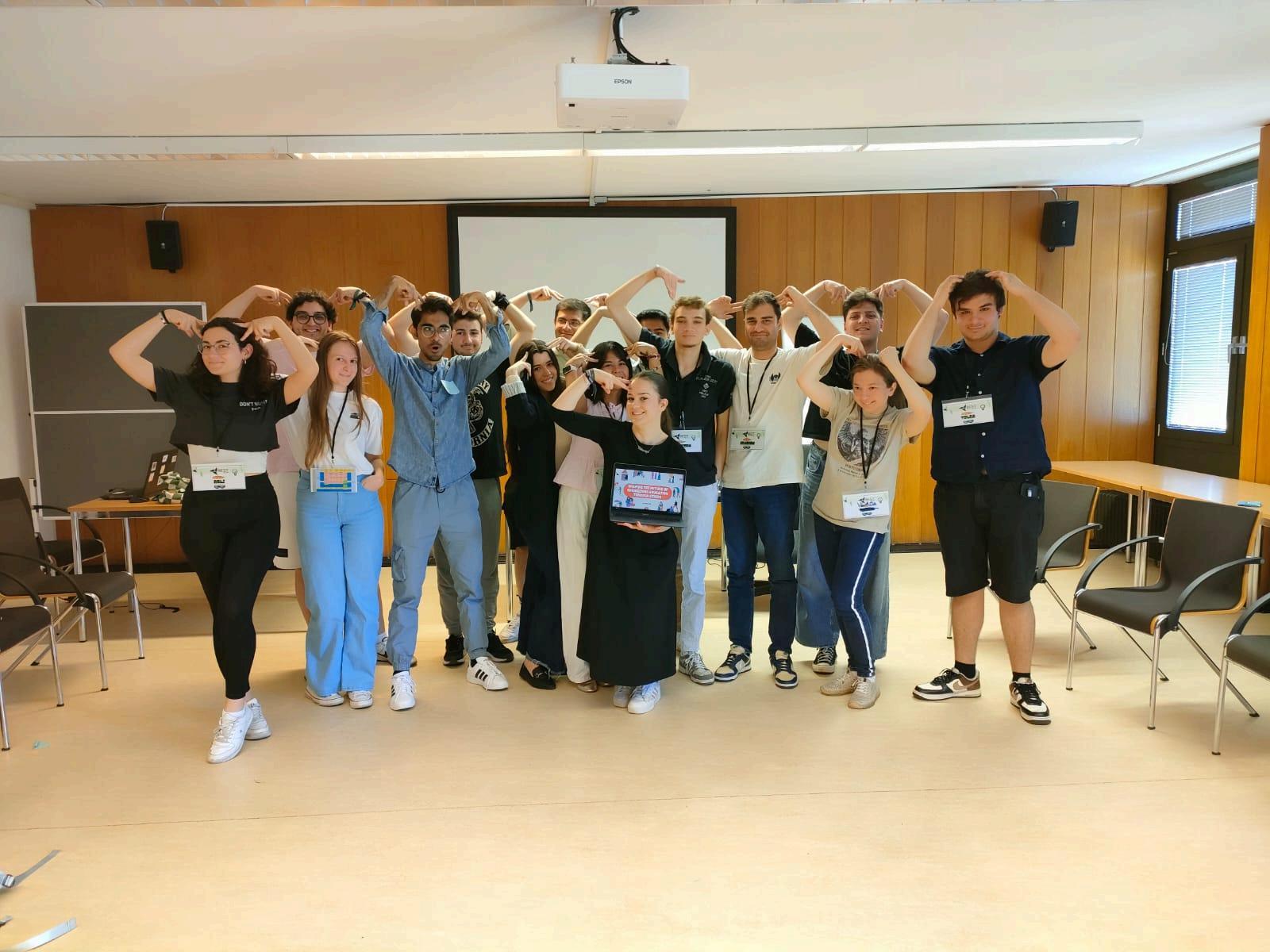
Background
The aim of this session was to introduce participants to the concept of ethics, giving them the opportunity to share their thoughts on the topic of incorporating ethics into higher education. Participants had the opportunity to:
● Reflect on the current situation regarding Ethics included in their Curriculums
● Take a part in debate and fight for or against implementing Ethics in the Curriculum
● Find pros and cons for the implementing or not implementing Ethics in the Curriculum
Methodology
Session was consisted of a few different parts:
1. Small presentation as an introduction of Ethics as a concept.
2 Sharing session - a part where participants share their experiences regarding whether ethics was included in their education and where they actually learned about ethics.
3 Debate - Participants were divided into two teams One team argued in favour of including ethics in the curriculum, while the other argued against it The debate consisted of both teams presenting their opening statements, followed by Team A's arguments and Team B's counterarguments Afterward, Team A responded to the counterarguments, and Team B concluded with a final response to Team A's rebuttal It finished with questions for each other
4. Reflection on the debate and discussing the pros and cons of (not) integrating ethics into the curriculum using sticky notes and writing ideas individually
5 Conclusion
Introduction
Definition: Ethics is the systematic and theoretical study of principles that define right and wrong behaviour
Before sharing the definition participants were asked to answer the question: What is ethics?
➢ Ability differentiate what's right and wrong
➢ Obey rules and fix everyone
➢ Choosing right options
Reflecting on the current situation
After getting familiar with the concept of ethics, here was a reflection on the current state of education regarding Ethics, with questions such as, 'Is Ethics included in any way in your curriculum, starting from primary school?' and 'Where do we learn about Ethics?'
What is their experience, is ethics included in their education?
➢ Did not learn about ethics, but learned about values. Family taught common sense to decide what's right and wrong
➢ This participant learned it first in primary school, and it developed throughout school As one grows up, they learn to do the right thing, especially in situations like standing up to bullying The way a person is raised and what they observe in their surroundings are also significant factors
➢ There is an ethics class at university, which is very technical Common sense develops individually over time, but family values also play an important role.
➢ In secondary school, there was a class called Religion and Ethics, which taught the importance of being a good Muslim or believing in God to be morally correct
Is ethics included in their university?
➢ Tolerance to other people and how to speak in academic writing
➢ Ethical integrity
➢ Electives on ethics and intellectual rights and sexual harassment.
➢ Ethics in the first year of school and they teach you how to take decisions as a responsible engineer.
● Team A (for): integrate ethics in curriculum
● Team B (against): don't integrate ethics in curriculum
*Note: Participants were assigned to teams and could not choose which team they wanted to join; they had to argue in favour of the given statement.
In the debate on integrating ethics into the curriculum, Team A argued in favour, emphasising the need for ethical education at the university level. They highlighted that family ethics may not always provide sufficient guidance and that ethics evolves with society Therefore, teaching ethics in university can foster inclusivity and help students make difficult ethical decisions, especially in fields like engineering They stressed the importance of distinguishing between ethical and cultural perspectives, suggesting that university is a crucial time for students to develop their values and ethical reasoning
Team B opposed the integration of ethics into the curriculum, arguing that ethics varies significantly across cultures, making it challenging to create a universal ethical framework in the classroom They contended that ethical principles are best learned from one's surroundings, including family and community, rather than in a formal educational setting They also pointed out that university should focus on technical skills, asserting that abstract ethical scenarios taught in class may not be applicable to real-life situations
Key counter arguments from Team A included the idea that ethics education is essential for guiding individuals in making the right decisions and that it is possible to generalise certain ethical principles They argued that exposure to diverse ethical perspectives in university can broaden students' understanding of humanity
In response, Team B maintained that practical experiences in the workplace are more effective for learning professional ethics and that existing laws regulate engineering practices, reducing the need for formal ethics education They also claimed that cultural considerations are crucial, asserting that universal ethical standards are not feasible.
In conclusion, the debate underscored the tension between the need for ethical education and the challenges of cultural diversity Team A advocated for a structured approach to teaching ethics, while Team B emphasised the importance of individual and cultural contexts in ethical understanding The main arguments centred around the relevance of ethics in professional education, the effectiveness of learning ethics in university versus real-life experiences, and the implications of cultural differences on ethical instruction.
Participants reflected on the debate and discussed the pros and cons of integrating ethics into the curriculum They also reflected on the advantages and disadvantages of not implementing any of the strategies and excluding ethics from education
Including ethics in curriculum
PROS CONS
Better conditions for next engineer generations for long time Teaches you things your community cannot teach you
NOT including ethics in curriculum
Lack of interest from students
Ethical behaviour is shaped by family
Lackness of effective education
Subjectivity
Sensitive topics
Overload curriculum
PROS CONS
Ease in curriculum Engineers will be more free while making some acts
Reflecting on the conclusion
Engineers will become less aware of ethical involves
Engineers make decisions based on their upbringing
Humans becoming robots and not being empathic
As participants could not choose the position and had to argue for the given statement, at the end they were asked for the personal opinion about the topic; Do they personally believe that ethics should be implemented in university curricula? Only one participant said that they do not believe in this.
Materials
● Outlines; [Day02][Viktorija][Outline][BSEAachen 24] Shaping the Future of Eng
● Minutes; [Day 02][Viktorija][Minutes][BSEAachen 24] Shaping the future of eng
● Presentation; Shaping the Future of Engineering Education through Ethics-2.pdf
● Flipcharts; [Shaping the future of engineering education through ethics][Viktorija]
Date: 27/6/2024
Facilitators: Viktorija Barisic
Minute taker: Valentina Pazos Valero
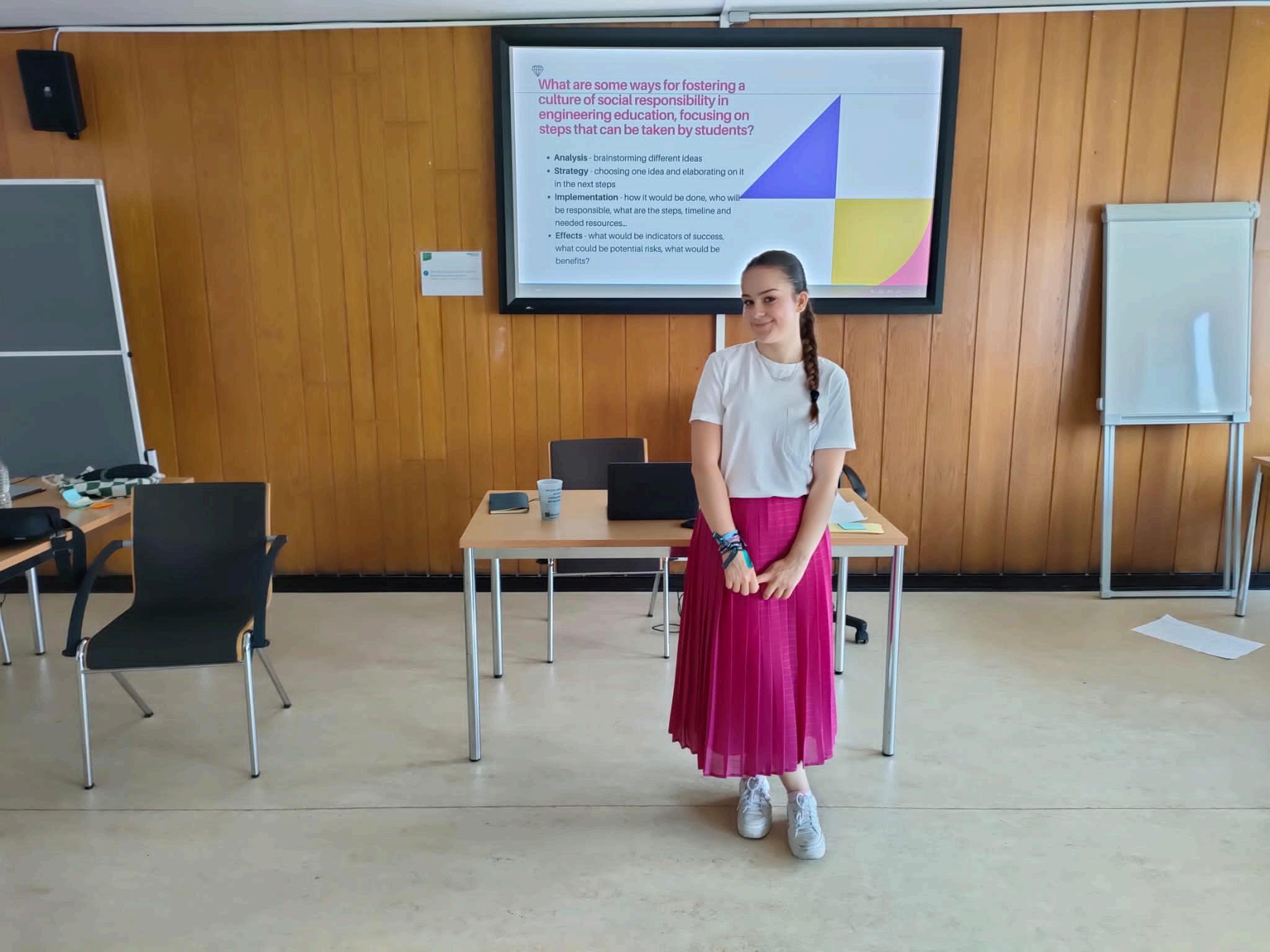
Background
This session explored factors that contributed to the decreasing sense of social responsibility among engineering students and focused on finding solutions to improve this situation The aim of the session was to develop strategies that students could implement to prevent a future characterised by a culture of disengagement in engineering education.
Methodology
Session was consisted of a few different parts:
1. Reflection on the previous session “We are responsible engineers, now what?”.
2 Association game with cards
3 Introduction of the concepts “social responsibility” and “culture of disengagement”
4 Brainstorming on factors that contributed to the situation
5. Group work - making strategies that would help to contribute to improving the situation
Outcomes
Reflection on the previous session “We are responsible engineers, now what?”
In the reflection on the previous session titled “We are responsible engineers, now what?”, participants discussed their conclusions and what they would implement moving forward. They noted that there were multiple conclusions from the session, highlighting various aspects from an engineering perspective, including human safety and sustainability, which would be implemented at different levels.
Association game with cards
Participants were also asked to choose a photo that they associate/connect to the following question, and to explain why they chose that one: What does social responsibility mean to you? What are your values that can be projected on the profession?
Introduction
Sharing and explaining definition of social responsibility and concept of culture disengagement in this area
Definition: Social Responsibility refers to the ethical framework and duty of individuals, organisations, and businesses to act for the benefit of society at large It involves making decisions and taking actions that contribute positively to the well-being of communities, protect the environment, promote fairness and equity, and uphold ethical standards
Concept - culture of disengagement: Engineering students are not interested enough in this topic (social responsibility) and they do not take any actions to get more included in improving the situation
They were asked to share opinion on the following question: Do you consider social responsibility important for your life in general and for your professional life?
The discussion touched on the concept of a culture of disengagement, with a general consensus indicating a moderate level of engagement. It was noted that social subjects are present in university, but many students do not take them seriously, often prioritising technical subjects instead There was concern that the lack of seriousness from teachers and the overwhelming focus on other subjects hinder students' ability to engage with ethical and social topics.
Participants expressed that there is insufficient practical experience in developing socially responsible engineers, with most assessments being theoretical and lacking implementation opportunities The general sentiment was that the current approach does not effectively prepare students for real-world applications of social responsibility.
Brainstorming on what are factors that contribute to culture of disengagement between engineering students regarding social responsibility.
➢ Curriculum is intense
➢ Lack of awareness and interest by both students and teachers
➢ People don’t have enough understanding of the topic
➢ Subjects consisted only of theoretical knowledge and on-paper based knowledge
➢ Students consider it useless
➢ Teachers don’t have enough time to tackle these topics and it is harder for them to make these classes
➢ We never put it in practice
➢ Students don’t have time to engage in social responsibility actions
➢ Students do not take it serious
➢ Not holistic mindset, only money is important
➢ Broad and difficult topic
➢ Lack of practical applications
➢ It is not emphasised enough generally
➢ Lack of courses about ethics
➢ Mostly not beneficial/you don’t get any rewards (like getting money for knowing something technical)
Participants were divided in 4 groups and each of them had the task to discuss the next question:
What are some ways for fostering a culture of social responsibility in engineering education, focusing on steps that can be taken by students? They focused on finding and brainstorming different strategies and ideas on how students could become more involved and proactive regarding this topic, including the steps they could take.
During the presentations, each group focused on various aspects of social responsibility in engineering education.
➢ Group 1 discussed economic responsibility, highlighting that the difficulty of technical subjects often leads to a reduced emphasis on social subjects They pointed out governmental negligence and the need for more regulations and enforcement from higher authorities, as technical subjects are prioritised over social subjects Possible solutions included volunteering for events that focus on social issues, self-education, serving as role models for younger students, and creating an independent curriculum with more social applications alongside the standard university curriculum.
➢ Group 2 concentrated on the role of social media in raising awareness They proposed creating events and charities, emphasising the importance of education. They identified seven aspects, including raising awareness, teaching, and training others They stressed the necessity of self-education to effectively raise awareness and suggested participating in courses and events to train peers, who could then educate younger generations. They also recommended identifying key topics and evaluating them separately to ensure a proper understanding for effective teaching
➢ Group 3 focused on environmental issues and the need to inspire younger generations through social projects, workshops, and optional subjects like ethics They suggested motivating students through competitions, social media campaigns, and highlighting the consequences of environmental neglect to establish positive habits. A question raised was about who should inspire students, with a consensus that teachers play a crucial role in this process
➢ Group 4 proposed that student organisations could more effectively raise awareness about ethical problems than teachers, as they might resonate better with peers. They suggested forming student groups to establish main objectives aimed at raising awareness of global issues and taking action beyond workshops They emphasised organising campaigns, conferences, workshops, and presentations to engage students actively. While acknowledging that university lectures have their value, they argued that alternative activities would encourage and engage students more effectively
Materials
● Outlines; [Day04][Viktorija][Outline][BSEAachen 24]Addressing the culture of …
● Minutes; [Day04][Viktorija][Minutes][BSEAachen 24] Culture of Dissengagement
● Presentation; 1 Adressing the culture of disengagement
● Flipcharts; [Addressing the culture of disengagement][Viktorija]
Date: 26/06/2023
Facilitators: Tuur
Minute taker: Ariel
Background
The session was initially envisioned as a follow-up of the climate Fresk workshop with some of the typical follow-up activities turned into a slightly more elaborate session on its own. This session imagines a world in which responsible engineering has been included in engineering curricula and where young graduates, or still students, are invited to apply their responsibility in their lives The session introduces specific roles that each of us have in society and invites participants to think which actions they would take in that aspect of life, as a responsible engineer
Methodology
Presenting the framework: Part 1
As an introduction the participants are invited to share actions in their life that they do to act responsibly. Most of the example actions indeed refer to the role of either a professional role, a volunteer or a consumer Then the framework was presented which explains the two most straightforward roles, which are the role of consumer and the role of a professional or a volunteer
Breakout 1
The participants are split in two different groups, one for each role and they are then invited to each come up with three actions that they can take in this role They are encouraged to discuss and ideate together. After ten minutes the groups switch to the different roles. After another ten minutes the groups were asked to vote on their three most important actions
Presentations and voting 1
After both tables are finished, everybody gathers around and is invited to present the actions that they voted as most impactful They are then asked to place these actions on an impact effort scale
Presenting the framework: Part 2
After the first round, the question is asked if they could imagine any other roles in society after which the final three roles are identified. These are the roles of an investor, a citizen and a role model.
Breakout 2
Participants are invited to once again split into 3 groups and think of actions for each of the roles after which they each conclude on a few main actions for each of these roles
Presentations and voting 2
The participants gather back, present their actions and place them on an impact-effort chart.
Actions are divided for each role with a description of their relative impact effort
Professional / volunteer
1 Speak up if you see something wrong in your working environment - Participants agree that it requires effort.
2 Prioritise Human safety - Participants agree that it requires less effort and very high impact
3. Being sustainable - Participants agree that it should be in the same place as “choosing sustainable companies” from the consumer’s side
4 Ensure that companies are fair to their workers: equal rights and equal wages - High effort, high impact
5. Choosing a more sustainable company over a cheaper tech company - Medium to high effort, low impact
6 More transparency is how things are manufactured (material used, methods, etc )High effort, medium impact
Consumer
1. Respect the corporates: be respectful to the workers: people working at call centres for example - High impact medium to high effort
2 Do not throw trash in clean places - Small effort high impact
3 Respect professional workspaces - Being respectful is easy, being nice is more difficult
4 Use Renewable Energy sources - Participants discuss the position on the impact-effort matrix
5. Riding bicycles to go work rather than using cars - Participants discuss the position on the impact-effort matrix.
6 Check if a company is sustainable before buying its products or using their servicesLot of effort but also high impact
Citizen, Investor and Role model
1 Contributing to discoveries that make effects
2. Going to Vote - Low effort, medium impact
3 Report any inconvenience to responsible institutions (police for example)
4 Being legal, follow the law - less effort, much impact
5 Being aware of your rights - Medium effort, medium impact
6. Do not consume products that promote wars - high effort, high impact
7 Making sure that the company you are investing in is sustainable - Mid impact, mid to high effort
8. Investing in Start-ups - Mid impact mid effort but higher than charity
9 Investing in charity - Mid effort mid impact
10 Establishing an organisation helping people with grants (for students for example)High impact, super high effort
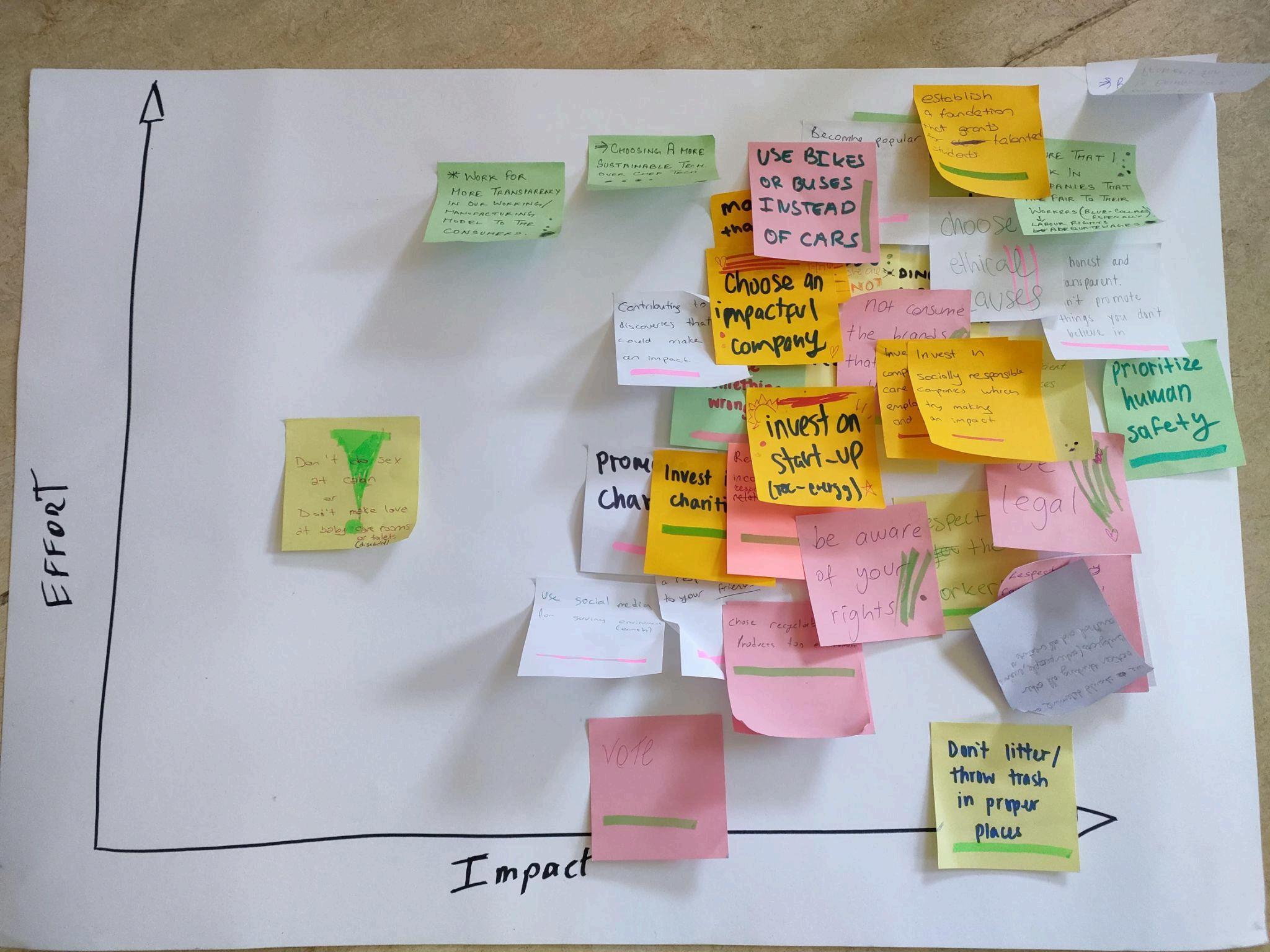
Materials
● Outlines; [Day03][Tuur][Outline][BSEAachen 24] We're responsible engineers,
● Minutes; [Day 03][Tuur][Minutes][BSEAachen 24] We're Responsible Engineer…
● Presentation; [Day 03][Tuur][Slides] We’re responsible engineers!
● Photos [We are responsible engineers, now what?][Tuur]
Date: 27/06/2024
Facilitators: Ariel Ediang
Minute taker: Tuur Knevels
Background
Purpose and Motivation
● The session aims to address the evolving responsibilities of engineers in a rapidly changing world With increasing emphasis on sustainability, ethics, and social impact, there is a need to reform engineering curricula to better prepare graduates for these challenges.
● Previous sessions have highlighted the importance of embedding core values such as ethical decision-making, social responsibility, and environmental stewardship into engineering education.
Objectives
● Refine Fundamental Values: To identify and refine the fundamental values that should characterise an engineer's professional conduct This is based on insights gathered from previous sessions and discussions
● Develop Strategic Framework: To brainstorm and develop a strategic framework that incorporates Responsible Engineering into the curriculum, ensuring that future engineers are equipped with the necessary knowledge and skills
Session Format
● The session is designed to be interactive, with a mix of hands-on activities and discussions This format encourages active participation and collaboration among attendees
Methodology
Key Activities
● Identifying Qualities of a Responsible Engineer: Participants discuss and identify key qualities that define a responsible engineer and explore how these can be developed through education
● Recap of Previous Sessions: Participants reflect on what they have learned from previous sessions and share their insights.
● Brainstorming and Problem-Solving: Using methods like TRIZ and 25/10 Crowd Sourcing, participants brainstorm ideas for curriculum reform and identify practices that contradict Responsible Engineering principles.
● Strategic Framework Development: Participants work together to define the minimum specifications for the curriculum to ensure alignment with Responsible Engineering values
● 15% Solutions: Participants determine small, immediate steps that can be taken towards curriculum reform.
Expected Outcomes:
● A set of actionable strategies and ideas for integrating Responsible Engineering principles into engineering curricula
● Enhanced understanding among participants of the importance of ethical and responsible engineering practices.
● A collaborative framework that can be used to guide future curriculum reforms
Outcomes
1 Introduction
● Ariel gave the introduction, welcoming all participants and outlining the session's objectives and agenda
● Expectations were discussed
2. First Activity: Identifying Qualities of a Responsible Engineer
● Participants paired up in groups of two to discuss what quality a responsible engineer should have and how it can be developed through education
○ First round: Each participant shared their thoughts with their partner
○ Second round: Participants switched partners and repeated the discussion
○ Third round: Another switch of partners to ensure diverse interactions and perspectives.
● Recap of Previous Sessions: 1, 2, 4, All First question: What have they learned?
● Individual reflections:
○ Participants took a minute to reflect silently on their learnings from previous sessions.
Key insights included the importance of broadening knowledge through reading and the value of practising soft skills through interactions and learning about models like impact-effort
○ Pair discussions:
■ Participants shared their reflections in pairs, building on each other's ideas
● Group discussions (groups of 4):
Each group consolidated their thoughts and presented key learnings to the larger group
- First presentation: Emphasised the value of respectful debate, seeing different perspectives, and not taking things personally.
- Second presentation: Highlighted the importance of balanced discussions, learning to let others speak, and correcting previous misconceptions.
- Third presentation: Focused on ethics, making ethical decisions, and respecting diverse opinions
Second question: What opportunities do you see for making progress in responsible engineering in curricula? How would you handle it and which ideas or actions do you recommend?
● Individual thinking: Participants spent a minute reflecting on potential opportunities
● Pair discussions: Shared their ideas with a partner
● Group discussions (groups of 4):
○ First group: Suggested self-education, active workshops, and peer teaching to foster a culture of continuous learning
○ Second group: Proposed independent student organisations, field interactions, workshops, and case studies to enhance practical learning
○ Third group: Recommended connecting with experienced professionals, alumni, or company representatives to provide real-world examples and mentorship
3 Brainstorming a Curriculum that Opposes Responsible Engineering
● Participants split into 3 groups and used the 1, 2, 4, All method to brainstorm a curriculum that contradicts Responsible Engineering principles
○ Group 1 presentation: Suggested a curriculum focused solely on science without social sciences or ethics, emphasising theoretical and practical applications without responsibility.
○ Group 2 presentation: Proposed including social courses that promote extreme nationalism and defence policies, bringing in biassed speakers to reinforce these ideas.
○ Group 3 presentation: Recommended eliminating social and extracurricular activities, promoting unpaid jobs, and limiting interaction with professors to theoretical learning only
Group Discussions after a small break
● Group 1: Discussed the benefits of internships and support from professors for extracurricular activities
● Group 2: Highlighted the rigidity of most curricula and the need for more flexibility, noting that defence programs often receive more funding than education
● Group 3: Argued that focusing on technical subjects could standardise engineering education across universities, making it more universal.
Question: If you were 10 times bolder, what policy would you recommend for responsible engineering? What first step would you take to get started?
● Participants reflected on the question, shared their ideas in pairs, and then scored each other's ideas.
● Ideas presented and scored included:
○ Banning companies that support oppressive regimes
○ Prohibiting companies that produce chemical waste.
○ Challenging educational institutes and sharing opinions.
○ Regulating rules with consequences for irresponsible actions
○ Punishing environmental polluters more severely
○ Running for president to make regulations for stable education and economics
○ Banning ChatGPT for students
● Winning idea: Scored 22, highlighted : Punishing environmental polluters more severely.
● Participants determined small immediate steps towards curriculum reform:
○ Be mindful of ethical rules.
○ Communicate with the administration and suggest ethical courses
○ Speak with the faculty secretary and recommend subjects for the ethics courses.
○ Present the event's outcomes to the dean
○ Discuss with the dean to update subjects according to ethical standards
○ Change the content of classes.
○ Compare local ethical practices with those of other countries
○ Provide active feedback on the curriculum
○ Promote helpful organisations and projects.
○ Talk to the university about responsible engineering.
○ Speak up against bad practices
○ Share knowledge with friends
6. Conclusion
The workshop on "Reform of Engineering Curricula to Prepare Engineering Graduates for Their New Responsibilities" was a significant step towards reshaping the future of engineering education. Through a series of interactive activities and collaborative discussions, participants were able to delve deep into the core values that should define a responsible engineer and brainstorm actionable strategies for integrating these values into the curriculum.
● Key Takeaways:
○ Enhanced Understanding: Participants gained a deeper understanding of the importance of Responsible Engineering principles, including ethical decision-making, social responsibility, and environmental stewardship
○ Collaborative Efforts: The session fostered a collaborative environment where participants could share their insights and build on each other's ideas, leading to a richer and more diverse set of strategies for curriculum reform
○ Actionable Strategies: The use of methods like TRIZ and 25/10 Crowdsourcing enabled participants to identify current practices that contradict Responsible Engineering principles and generate innovative ideas for integrating these principles into the curriculum
○ Immediate Steps: The 15% Solutions activity highlighted small, immediate steps that participants can take to begin implementing changes in their own educational contexts
● Moving Forward:
The insights and strategies developed during this workshop provide a strong foundation for ongoing efforts to reform engineering curricula. By continuing to engage in discussions, share knowledge, and advocate for responsible engineering practices, participants can contribute to the development of a new generation of engineers who are not only technically proficient but also socially and ethically responsible.
The workshop concluded with a sense of optimism and commitment to making meaningful changes in engineering education Participants left with a clear understanding of the next steps and a renewed dedication to fostering a culture of responsibility and ethics in the engineering profession.

Summary of the Presentation
Dr Vivek Ramachandra, a Lecturer in the Integrated Engineering Program (IEP) at the Centre for Engineering Education (CEE) of University College London (UCL), made an online presentation on the importance of embedding Responsible Innovation (RI) in engineering curricula at UCL. He emphasised the need for engineers to consider the ethical, societal, and environmental impacts of their work, particularly in the context of the climate crisis and technological advancements.

RI is defined as ensuring that research and innovation are ethical, minimise negative impacts, and maximise societal benefits. Key aspects of RI include ethics, social
sustainability, environmental sustainability, risk and safety, and equity, diversity, and inclusion. Dr Ramachandra shared that UCL integrates RI through week-long IEP Scenarios, which are team projects addressing real-world engineering problems.

Challenges in embedding RI generally include a lack of willingness, time, and knowledge among faculty Solutions involve persuading stakeholders, providing support for content creation, and offering contextualised resources. Successful scenarios at UCL have integrated ethical considerations and global initiatives, fostering student engagement and social responsibility. Future directions at UCL call for community-based approaches, workshops, practical tools, and continuous adaptation to effectively integrate RI into engineering education, along with support mechanisms to help students understand the socio-emotional dimensions of their practice.
Dr. Ramachandra's presentation was highly relevant to the participants of the BSE as it provided a comprehensive overview of how Responsible Innovation can be integrated into engineering curricula. This aligns with the goals of the European Society for Engineering Education (SEFI), which aims to enhance the quality of engineering education in Europe. Participants could use the insights from Dr Ramachandra's presentation to design, during their group project, an ideal curriculum that includes Responsible Engineering Practices. The outcomes of these projects will be used by the Educational Involvement Department of BEST to advocate for changes towards Higher Engineering Education Stakeholders. Additionally, participants can return to their universities and advocate locally for the inclusion of Responsible Engineering, fostering a more socially responsible and ethically aware generation of engineers.
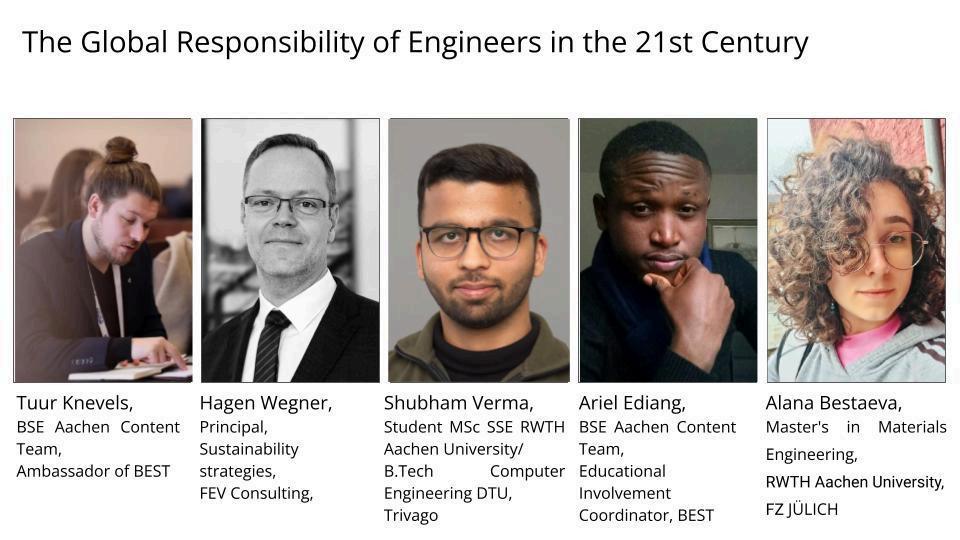
The panel discussion, facilitated by Tuur Knevels, brought together a diverse group of panellists to explore the ethical, social, and environmental responsibilities of engineers The session covered various topics, including ethical principles, motivation, expectations, dealing with responsibilities, and skills & curriculum
Ethical Principles:
Panellists reflected on their responsibilities as engineers The MSc student in Material Science (Alana) discussed the impact of AI hardware on jobs, the Mechanical Engineering student (Ariel) emphasised balancing personal values with professional duties, the Software Engineering student (Shubham) highlighted data privacy, and the experienced engineering consultant stressed the importance of critical thinking and scientific literacy.
Motivation:
Panellists shared their motivations for upholding responsible practices. The MSc. student in Material Science is driven by the need to sustain the planet, the Mechanical Engineering student by the urgency to act on global issues, the Software Engineering student by the belief in small actions making a difference, and the experienced engineering consultant (Hagen) by the insights from the book "Limits to Growth."
Expectations:
The discussion revealed varying expectations about responsibility The Mechanical Engineering student finds high responsibility daunting but seeks knowledge, the Software Engineering student emphasises long-term impact, the MSc student in Material Science faces dilemmas between personal and professional responsibilities, and the experienced
engineering consultant noted a shift from focusing on responsibility to business metrics over time.
Panellists suggested ways to prepare future engineers for the social impact of their work. The MSc a student in Material Science advocated for integrating economic and business education, the Mechanical Engineering student suggested extracurricular activities and interdisciplinary projects, and the Software Engineering student highlighted the importance of practical experiences.
Skills & Curriculum:
The panellists discussed specific skills for a responsible engineering curriculum The Mechanical Engineering student recommended guidelines for decision-making and emotional intelligence, the MSc student in Material Science supported non-technical credit points, and the Software Engineering student valued interdisciplinary courses.
The discussion highlighted the complexity and multifaceted nature of engineering responsibilities. Panellists from different backgrounds and stages in their careers provided diverse perspectives, emphasising the need for a holistic approach to engineering education and practice Key themes included the balance between personal values and professional duties, the importance of critical thinking and scientific literacy, and the role of motivation in driving responsible practices.
The panellists' insights underscored the evolving nature of engineering responsibilities, with a noticeable shift towards sustainability and social impact The discussion also revealed gaps in current engineering curricula, particularly in integrating non-technical skills and interdisciplinary learning
Conclusion
The panel discussion on "The Global Responsibility of Engineers in the 21st Century" provided valuable insights into the ethical, social, and environmental responsibilities of engineers The diverse perspectives of the panellists highlighted the need for a holistic approach to engineering education and practice By integrating interdisciplinary learning, emphasising emotional intelligence, promoting practical experiences, encouraging critical thinking, and supporting extracurricular activities, we can better prepare future engineers to address global challenges and make a positive impact on society
[Day01][Tuur andAriel][BSEAachen] Panel discussion [Day 01][Minutes][BSEAachen] Panel Discussion
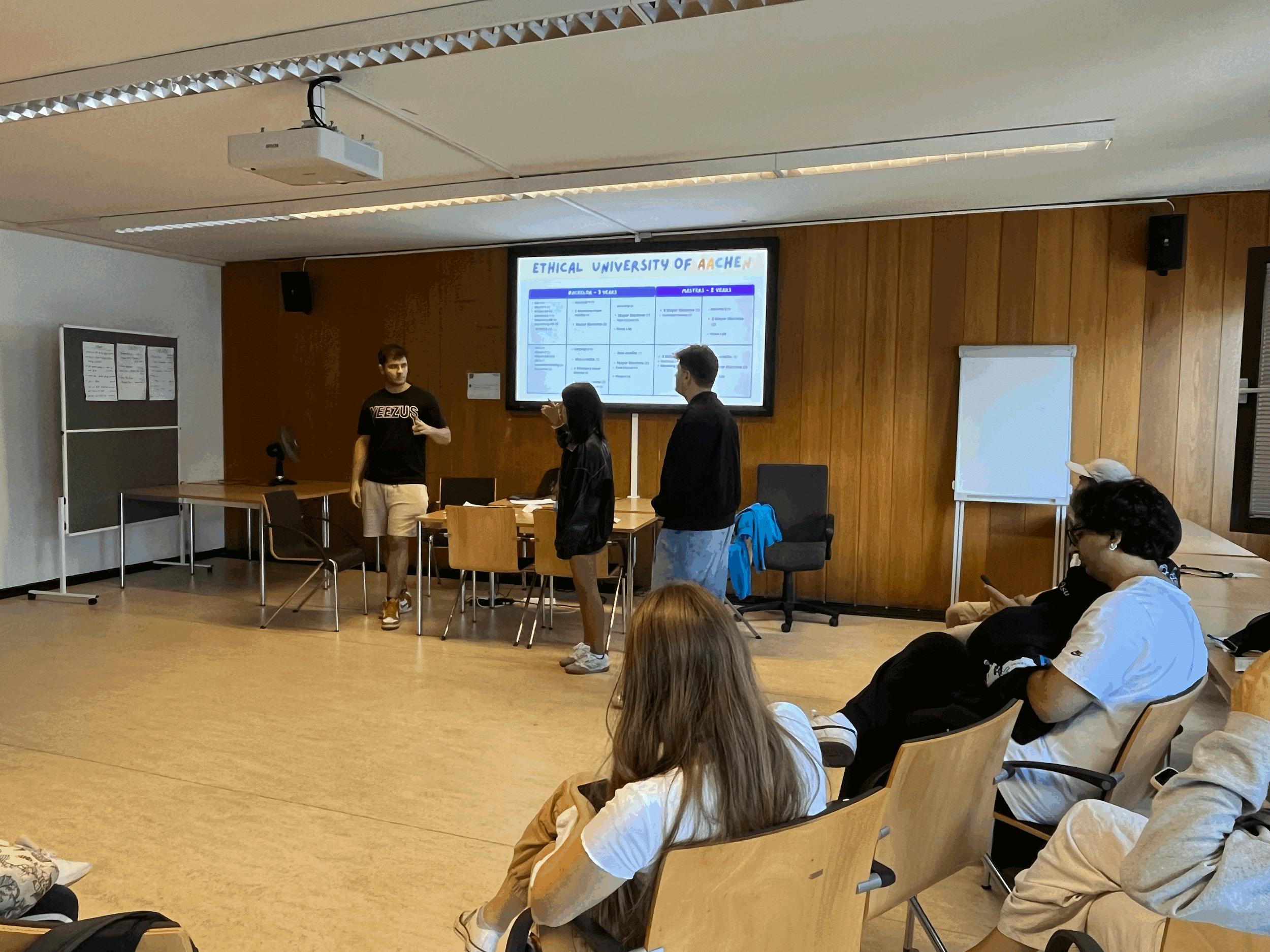
Project Overview:
Participants were divided into three teams to design a comprehensive and responsible engineering education program that balances academic rigour, practical experience, and personal development. The recommended programs span five years, with a three-year Bachelor's degree followed by a two-year Master's degree, each year comprising 60 ECTS credits Below are the outcomes from each team
Team 1 : Best University in this Town Team 1
Team 1 outlines a 3+2 BSc + MSc curriculum designed for multilateral development, focusing on a balance of soft skills, hard skills, and practical experience The curriculum includes a mix of technical courses, community engagement, personal development, optional subjects, practical experience, and language studies
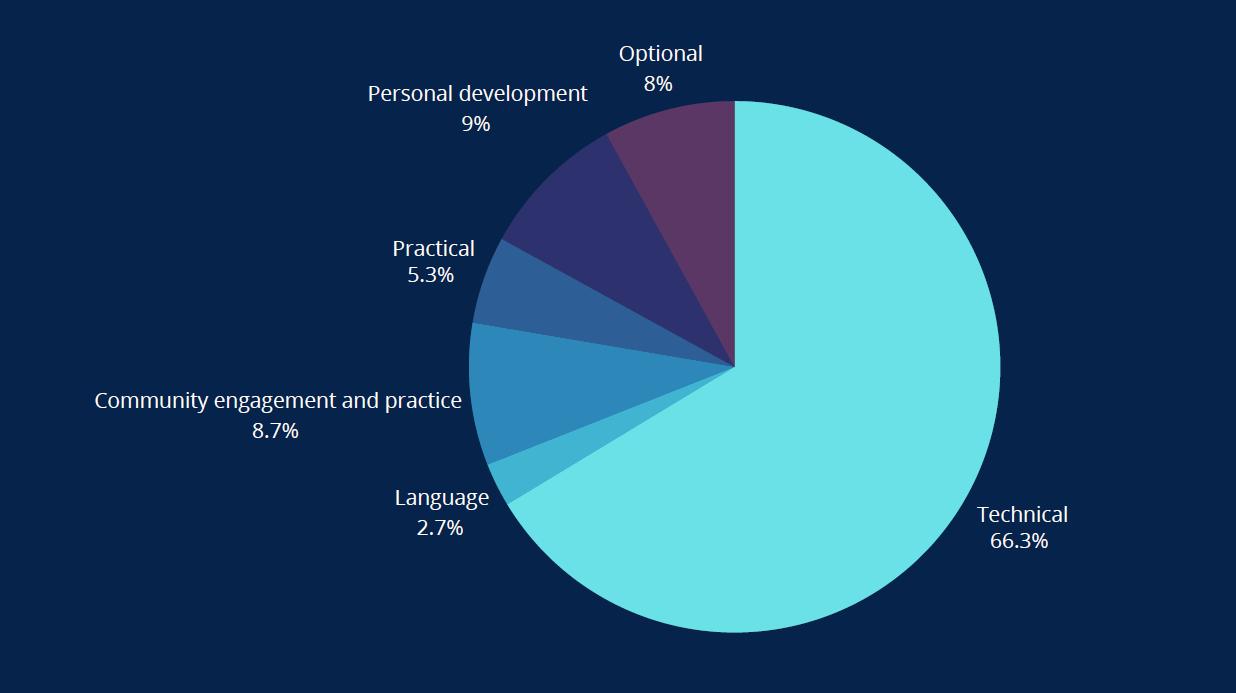
Curriculum Breakdown:
● First Year: Ethics, technical courses, optional subjects, community engagement, foreign language, business & management
● Second Year: Leadership, technical courses, optional subjects, business project, community engagement, foreign language, eco-design, and product development
● Third Year: Law and copyrights, technical courses, optional subjects, internship, community engagement, foreign language, AI, and a final project
● Fourth Year: Economics, technical courses, optional subjects, community engagement, foreign language, advanced AI.
● Fifth Year: Trade, technical courses, optional subjects, community engagement, foreign language, final project, and internship.
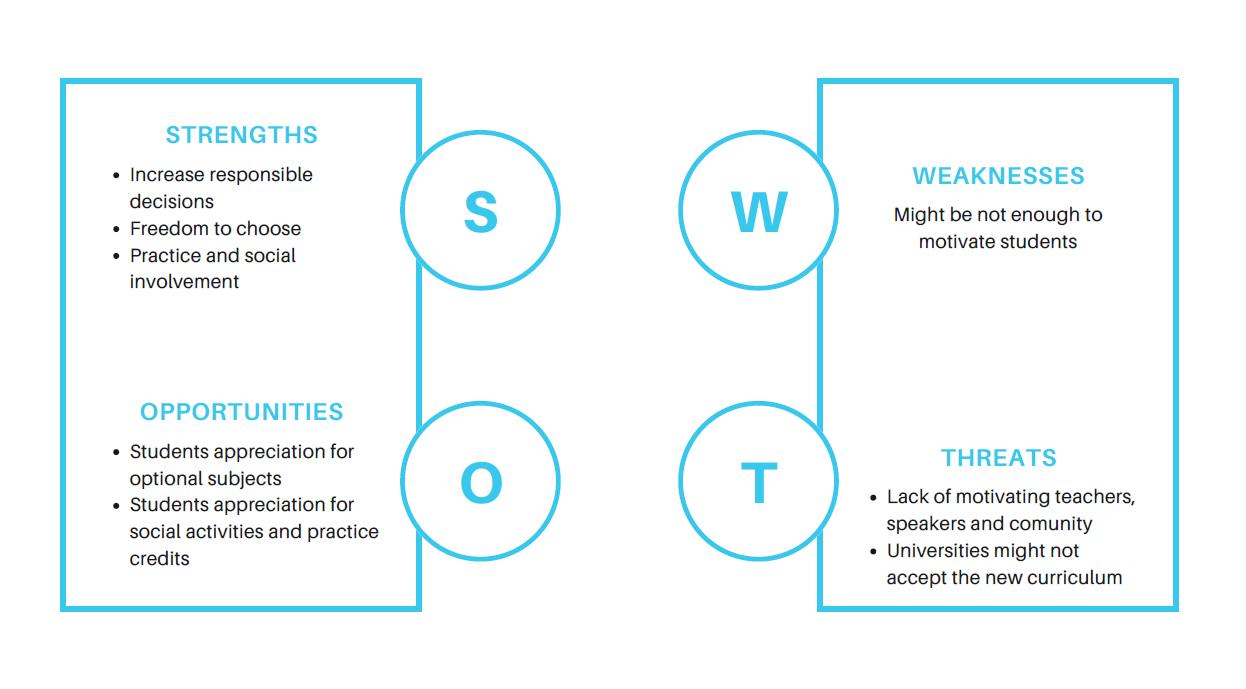
Team 2 : Team 2
Team 2 proposes the "Responsible Engineering Model Curriculum 2 0," which integrates ethical principles into engineering education The curriculum spans both bachelor's and master's programs, emphasising safety, ethics, responsibility, and sustainability
Bachelor's Program:
1 1st Semester:
○ Introduction to Engineering Ethics (3 ECTS): Covers ethical decision-making, case studies on engineering failures, and the role of engineers in society.
○ Communication Skills (3 ECTS): Focuses on effective communication techniques, technical report writing, and presentation skills
2. 2nd Semester:
○ Presentation and Public Speaking (2 ECTS): Techniques for impactful presentations and public speaking
○ Climate Change Mitigation (2 ECTS): Engineering solutions, policy frameworks, and case studies.
○ Social Responsibility in Engineering (2 ECTS): Corporate social responsibility, community engagement, and impact assessment
3 3rd Semester:
○ Diversity, Globalization, and Equality in Engineering (3 ECTS): Understanding global diversity, promoting equality, and the impact of globalisation
○ Team Dynamics and Leadership (3 ECTS): Teamwork, leadership styles, and conflict resolution
○ Project Management Basics (3 ECTS): Project lifecycle, time/resource management, and risk management
4 4th Semester:
○ Innovation and Entrepreneurship (3 ECTS): Basics of entrepreneurship, innovation management, and case studies.
○ Environmental Impact Assessment (3 ECTS): Methods, regulatory frameworks, and mitigation strategies
○ Soft Skills Development (3 ECTS): Critical thinking, emotional intelligence, and debating techniques
5 5th Semester:
○ Specialised ethics courses for different engineering disciplines (Chemical, Mechanical, Electronics, Electrical, Software) focusing on case studies, sustainability, and social implications
Master's Program:
1 1st Semester:
○ Advanced Ethics in Engineering (3 ECTS): Comprehensive study of ethical theories and complex cases
○ Advanced Communication Skills (2 ECTS): Effective verbal and non-verbal communication, cross-cultural communication.
○ Climate Ethics and Engineering (3 ECTS): Ethical frameworks for climate action and sustainable engineering projects
2 2nd Semester:
○ Global Challenges and Ethics in Emerging Technologies (3 ECTS): Ethical issues in AI, biotechnology, and nanotechnology
○ Intellectual Property Rights in Engineering (2 ECTS): Basics of intellectual property, patents, trademarks, and copyrights
○ Cultural Competence (3 ECTS): Understanding cultural diversity and ethical implications in global projects
Grading:
● Students are assessed through midterms, finals, case studies, projects, and essays Innovative grading systems are used to raise awareness and responsibility.
Presentation 3 : Ethical University of Aachen Team 3
Team 3 provides an overview of the theoretical “Ethical University of Aachen's curriculum” and key topics
Curriculum:
● General Courses: Academic writing, research, laws, regulations, sustainability (ethics), job health and safety, internships, and major courses like calculus, physics, chemistry, and economics
● Language Courses: English, German, French, Spanish, and sign language
● Non-Credit Electives: Sports, debates, arts, history, philosophy, volunteering, and workshops.
● Electives: Marketing yourself and your company (10%), technical courses (20%), and projects with ethical backgrounds (70%).
Degree Structure:
● Bachelor (3 years): Includes courses in calculus, physics, chemistry, engineering, ethics, academic writing, economics, languages, internships, and electives
● Masters (2 years): Focuses on major electives, technical courses, internships, and thesis work
Key Topics:
● Emphasis on ethics at all levels
● Encouragement for students to start local and grow globally.
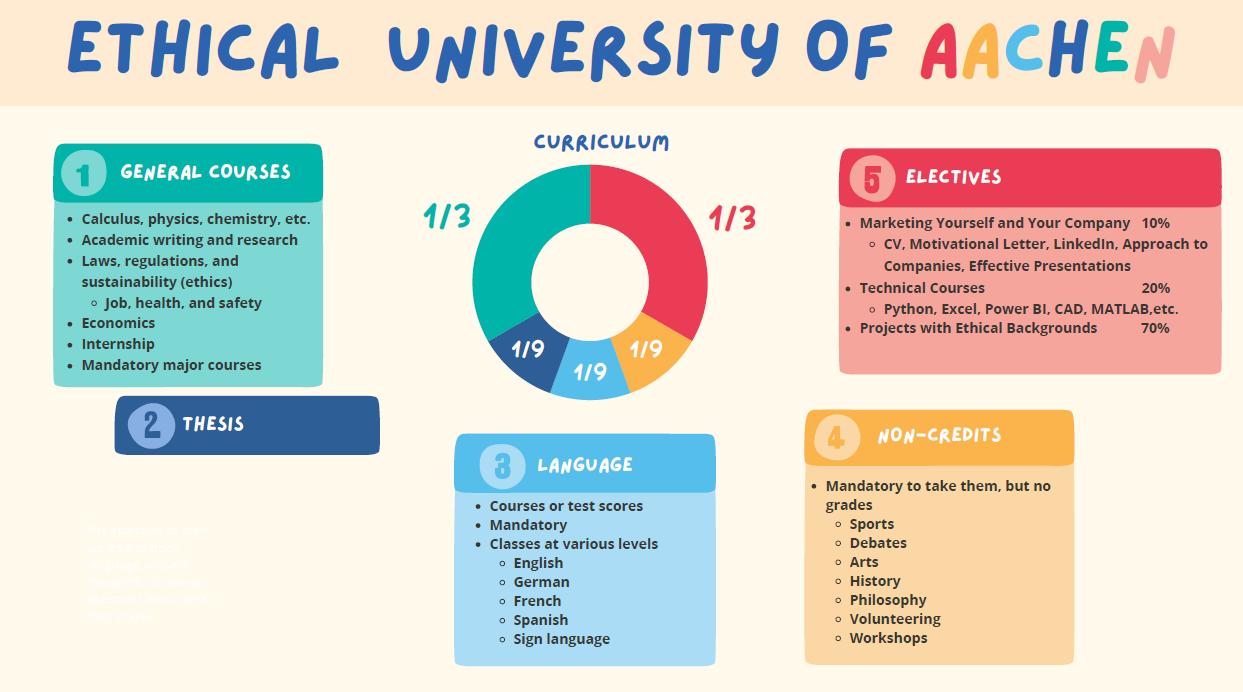
Presentation 4 : Reworking a General Engineering Curriculum Team 4
This presentation outlines a proposal for reworking a general engineering curriculum to address current issues and enhance the educational experience for engineering students. The proposed changes aim to integrate ethics, provide more interactive lessons, and offer practical opportunities for skill application Below is a summary of the key points discussed in the presentation
Current Problems
● Ethics: Lack of discussion
● Applications of Skills: Insufficient technical opportunities.
● Lessons: Not interactive enough.
● Lectures: Too many and too long
1 Ethics Subjects: Integrate ethics into various subjects like physics, chemistry, and engineering.
2 Additional Subjects: Writing and soft skills, business, internships, effective studying tips, and environmental impacts of engineering
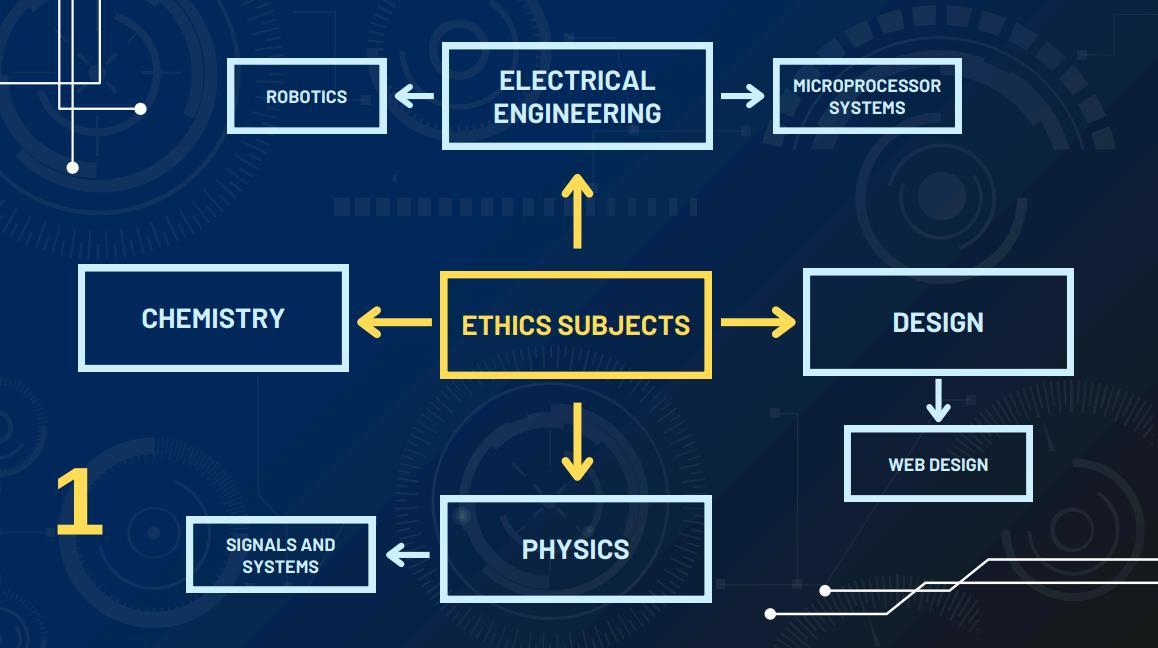
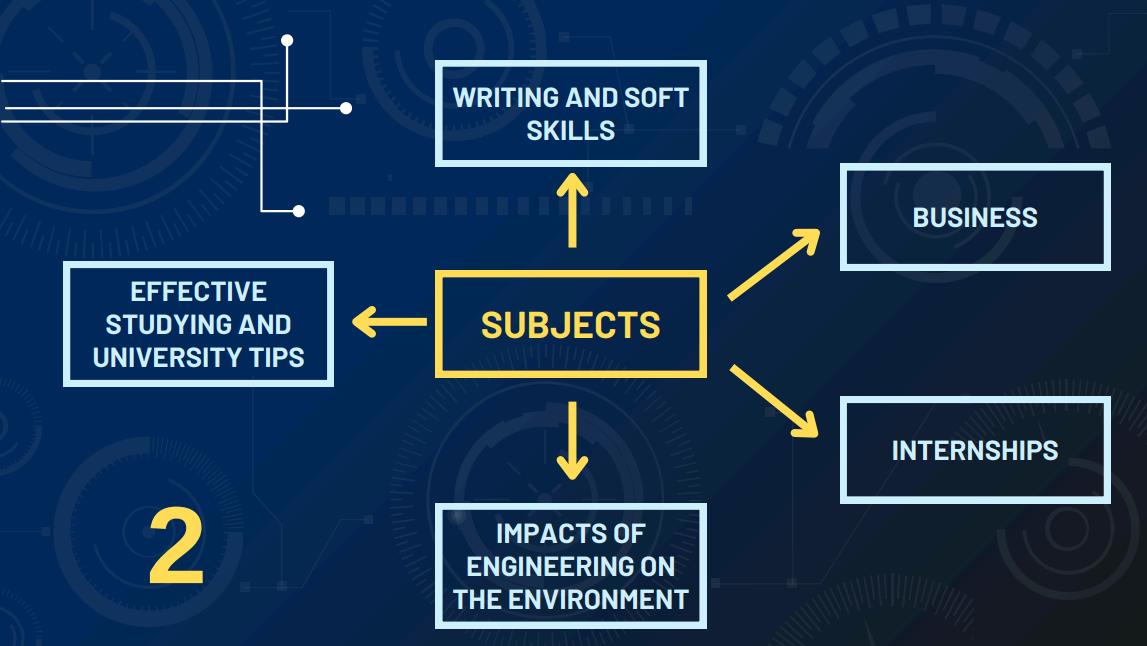
● Effective Studying and University Tips: Develop better study techniques, time management, and understanding of the university environment
● Writing and Soft Skills: Improve written and oral communication through exercises and presentations.
● Business : Reinforce technical skills and teach leadership skills
● Internships: Provide real-world technical experience and teach professionalism
● Impacts of Engineering on the Environment: Educate on sustainable practices and environmental stewardship.
● 1st Year: 48 mandatory credits, 8 optional, 4 elective.
● 2nd Year: 44 mandatory credits, 12 optional, 4 elective
● 3rd Year: 40 mandatory credits, 16 optional, 4 elective
● 4th Year: 18 mandatory credits, 12 optional, 15 for internships, 15 for thesis
● Productivity and Creativity: Student clubs, workshops, societies
● Competitiveness: Opportunities for international competitions.
● Improvement: Incentives for professors to teach smaller groups

Conclusion
● Benefits: More ethics discussions lead to fewer accidents, interactive lessons improve concentration, reduced lectures provide more free time, and summer activities offer productive learning opportunities.
This section highlights personal impressions from participants and organisers, reflecting their experiences and thoughts about the event
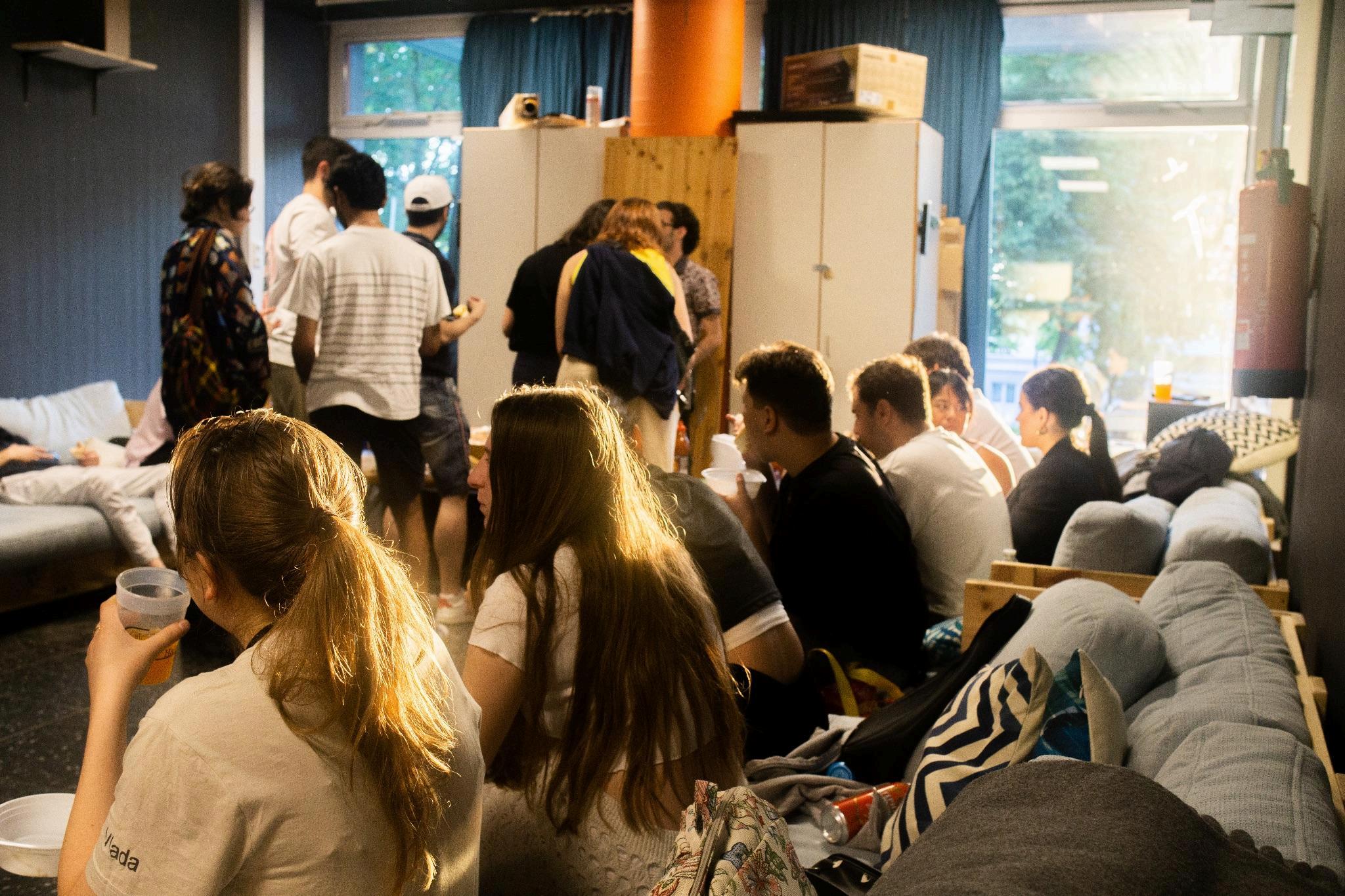
“Years from now, you’ll be more disappointed by the things you didn’t do than by the ones you did. So throw off the bowlines. Sail away from the safe harbour. Explore. Dream. Discover.” – Mark Twain
“BSE Aachen was my first time at a BEST event I actually had some worries about how it was going to be, but thanks to your kindness and support, it went better than I expected. Being part of the project group was really fun for me. Thanks again for everything! ����”Oguz (Participant)
“For me it was a memorable experience, filled with different challenges, but in the end I'm glad to have met the people there and to make it fun for the people that took part in the event ” - Max (Organiser)
“Participating in the BSE Aachen was a fantastic experience for me. I had the chance to meet fellow students from diverse cultures, which broadened my perspective and helped me understand the value of collaboration The activities throughout the project were both educational and enjoyable, and I truly enjoyed contributing I'm very happy to have been part of this project.” - Asli (Participant)
“The event was really great and properly organised The sessions were well planned which helped everyone to participate and learn..” - Ramanuj (Organiser)
“For me, BSE Aachen was one of the most memorable experiences within BEST Although it was very intense and demanding, if I could, I would relive it exactly the same way It's through such experiences that we learn and grow the most, and I believe we all grew a little during this event Aachen and the people from BSE will always hold a special place in my heart ” - Viktorija (Content Team)